
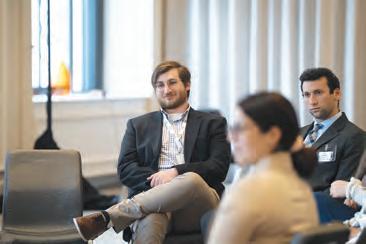
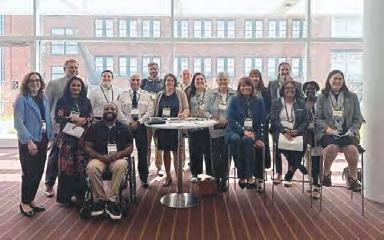










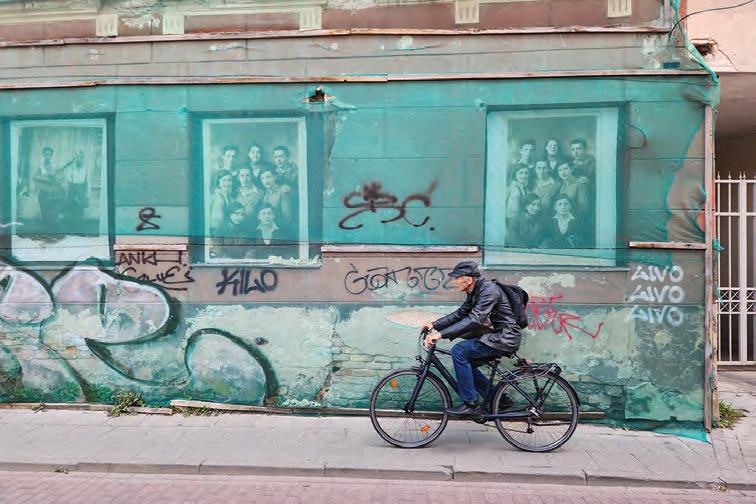
By Adam Reinherz | Senior Sta Writer
ASeptember seminar to northern Europe confronted some of the horrors of Jewish history while highlighting paths for a better future. Operated by Classrooms Without Borders, a Pittsburghbased organization providing experiential professional development for educators, the tour introduced participants to Lithuania, Latvia, Estonia and Finland through the eyes of guides, historians and local residents.
Fourteen travelers — including this reporter — began the program on Sept. 7 in Vilnius’ Old Town, where they traversed Pilies Street, a historic thoroughfare that guide Ernest Irens called the “main artery of the city for 600 years.”
Though Lithuania’s Jewish presence dates to the 14th century, the 1918 adoption of the Act of Independence gave Lithuanian Jews a new start, said Irens, an educator at Vilnius’ Sholom Aleichem ORT Gymnasium. Breaking from the Russian Empire, independence represented the “promise of autonomy.”
While Lithuanian Jewish history includes periods of persecution, there’s also a storied past. Between the intellectual contributions of 18th-century sage the Vilna Gaon, the 1886 printing of the Vilna Shas (the definitive edition of the Talmud), the city’s maintenance of 130 synagogues before World War II — when its Jewish population totaled 80,000 — Vilnius was considered Yerusholayim d’Lite (Jerusalem of Lithuania).
Educators cannot properly teach history, or begin explaining the Holocaust, without understanding Vilnius’ former “vibrancy,” CWB founder and executive director Tsipy Gur said.
For months, Gur and CWB staff designed an itinerary to showcase a culture that had changed drastically.
Walking tours through the former Jewish quarter and ghetto can help people make meaningful connections, said Daniel Gurevich, 46, co-owner of the Vilnius-based travel company Jerulita Travel. “People who travel here for the first time — this is a magic moment of touching the ground of their ancestors.”

Helping illuminate the past was Hadas Kalderon, an Israeli actress and playwright, who served as artistic director of Israel’s National Theater between 2019-2024.
Kalderon, 49, flew to Vilnius from Tel Aviv to describe a faded landscape once inhabited by her grandfather, Abraham Sutzkever, a Yiddish writer whom The New York Times called the “greatest poet of the Holocaust.”
“This was his city,” Kalderon said.
Speaking near the stage of the ghetto’s stillstanding theater, Kalderon said the venue once gave “life” to poets, painters, musicians and intellectuals.
Between April 26, 1942, and Sept. 23, 1943, the theater welcomed 38,000 spectators and hosted 120 performances, according to Yad Vashem, the World Holocaust Remembrance Center.
“That’s how they fought against the Nazis,” Kalderon said. “This was the light in the darkness.”
Kalderon escorted CWB participants outside the theater toward the ghetto library.
With nearly 45,000 books and thousands of patrons, the library offered refuge, Kalderon said. “People came here, sat here and found a safe place for their soul.”
opportunity of a lifetime for Pittsburgh-based Jewish visual art historian Jill Joshowitz.
As the October 27 project coordinator at the Heinz History Center, Joshowitz was part of a delegation of scholars, rabbis and lay leaders invited to visit the National Museum of Damascus, where more than two dozen panels of biblical scenes painted 1700 years ago are housed.
“I spent almost a decade of my life researching and writing about these paintings, so getting to actually see them — something I never thought would happen in my lifetime — was absolutely surreal,” said Joshowitz, of Squirrel Hill. “Each, on its own, was fascinating, but all together, they were spectacular.”
Highly colored and painted on mudbrick walls in the Dura-Europos Synagogue, they are the oldest and only example of Jewish, figural biblical imagery known to have survived from late antiquity, said Joshowitz, who emphasized that other, similar illustrations from the same era are in stone or mosaic. “That makes the paintings even more special, because they were made with organic materials, which tend to decay over time.”
What helped to preserve them through

By Adam Reinherz | Senior Staff Writer
Two Jewish students at the University of Pittsburgh School of Law traveled to Washington D.C. for a two-day summit focused on developing commu nity. Organized by JGO: The Jewish Grad Organization, the Aug. 30-31 gathering enabled Amallia Rascoe and Cooper Feiner to join more than 100 fellow Jewish graduate students in a series of discussions regarding best practices for cultivating Jewish identity on campus.
Rascoe, president of the Jewish Law Students Association at Pitt Law School, said she joined the JGO’s Miller Family Partners Summit because of her goal: “I’m trying to build the Jewish community at Pitt Law.”

What the conference delivered was not only “inspiration,” she said, but “moral and emotional support,” as well as instructions for growing a community.
Sessions offered opportunities to meet with elected officials, tips on administering effective student groups and advice for networking.
Practical takeaways from the summit, Rascoe, 24, said, included the need to personalize communication. In lieu of disseminating mass emails, a great way to “engage with your members is having points of contact.”
The student leader put the strategy into practice last week. After returning from D.C., she personally reached out to Jewish law students and invited them for Shabbat dinner.
Most prior dinners, she said, welcomed
p Cooper Feiner, left, was one of 100 Jewish graduate students to participate in the D.C. summit.
about eight people. “This Friday we had 16.”
Feiner, the business manager of the Jewish Law Students Association at Pitt Law School, praised the summit for its ability to connect like-minded individuals.
Having enjoyed the program so much last year, Feiner, 23, returned again this year.
The conference gives “leaders and future professionals in the Jewish community” a chance to hear about each other’s lives. Meeting people who are on “similar career paths” and getting their advice was beneficial. Also great, he said, was learning how student groups operate at schools with larger Jewish bodies.
Students at several universities are
experiencing antisemitism, but “I feel lucky to be at Pitt,” he continued. “We don’t have that many challenges.”
Feiner mentioned incidents occurring at other universities as well as the experiences of Jewish undergraduates at Pitt — last year, two students wearing yarmulkes were attacked on a Friday night — before describing life for Jewish students in the School of Law.
“In the law school, specifically, we have not had anything major happen, or really anytime I felt unsafe, or anytime somebody has come up to me and expressed feelings of not feeling safe,” he said.
Bolstered by the conference, Rascoe and Feiner both mentioned upcoming

SUBSCRIPTIONS subscriptions@pittsburghjewishchronicle.org 412-687-1000, ext. 2
TO ADVERTISE advertising@pittsburghjewishchronicle.org 412-687-1000, ext. 1
EDITORIAL DEPARTMENT
Email: newsdesk@pittsburghjewishchronicle.org
BOARD OF TRUSTEES
Evan H. Stein, Chair
Evan Indianer, Vice Chair
Derek Smith, Treasurer
Gayle R. Kraut, Secretary
Gail Childs, Dan Droz, Malke Steinfeld Frank, Seth Glick, Tammy Hepps, Judith Kanal, Cátia Kossovsky, Charles Saul
GENERAL COUNSEL
Stuart R. Kaplan, Esq.
Jim Busis, CEO and Publisher 412-228-4690 jbusis@pittsburghjewishchronicle.org
EDITORIAL Toby Tabachnick, Editor 412-228-4577 ttabachnick@pittsburghjewishchronicle.org
Adam Reinherz, Senior Staff Writer 412-687-1000 areinherz@pittsburghjewishchronicle.org
David Rullo, Senior Staff Writer 412-687-1000 drullo@pittsburghjewishchronicle.org
ADVERTISING
Amy Weiss, Account Executive (412) 613-0697 aweiss@pittsburghjewishchronicle.org
PRODUCTION
Jeni Mann Tough Production Manager
Carl Weigel
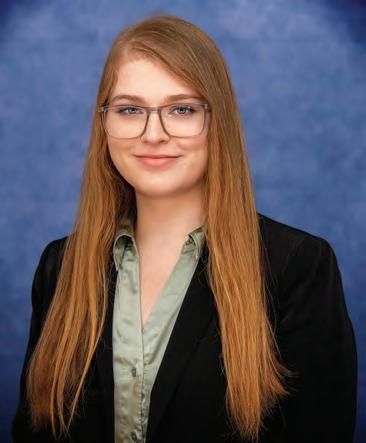
programs, including Shabbat dinners and a speaker series with Jewish attorneys, intended to attract Jewish law school students.
“Anytime you can get groups of Jewish professionals together, it’s going to be a really informative and amazing experience,” Feiner said.
For many Jewish students, an endless news cycle and the deluge of negative stories makes it “feel like it’s a constant emotional attack every day,” Rascoe said. The summit was a reminder of how to achieve a key goal in Pittsburgh, she continued. “I want to create a space where we can celebrate the small wins and get to experience all the amazing things that Judaism has to offer.” PJC
Adam Reinherz can be reached at areinherz@pittsburghjewishchronicle.org.
5915 Beacon St., 5th Floor Pittsburgh, PA 15217
Main phone number: 412-687-1000
Subscriptions: 412-687-1000, ext. 2
Art/Production Coordinator Subscriptions subscriptions@pittsburghjewishchronicle.org 412-687-1000, ext. 2
Published every Friday by the Pittsburgh Jewish Publication and Education Foundation 5915 Beacon St., 5th Floor Pittsburgh, PA 15217
Phone: 412-687-1000
POSTMASTER: Send address change to PITTSBURGH JEWISH CHRONICLE, 5915 BEACON ST., 5TH FLOOR PITTSBURGH, PA 15217 (PERIODICAL RATE POSTAGE PAID AT PITTSBURGH, PA AND AT ADDITIONAL MAILING OFFICES) USPS 582-740
Manuscripts, letters, documents and photographs sent to the Pittsburgh Jewish Chronicle become the property of this publication, which is not responsible for the return or loss of such items.
The Pittsburgh Jewish Chronicle does not endorse the goods or services advertised or covered in its pages and makes no representation to the kashrut of food products and services in said advertising or articles. The publisher is not liable for damages if, for any reason whatsoever, he fails to publish an advertisement or for any error in an advertisement. Acceptance of advertisers and of ad copy is subject to the publisher’s approval. The Pittsburgh Jewish Chronicle is not responsible if ads violate applicable laws and the advertiser will indemnify, hold harmless and defend the Pittsburgh Jewish Chronicle from all claims made by governmental agencies and consumers for any reason based on ads appearing in the Pittsburgh Jewish Chronicle
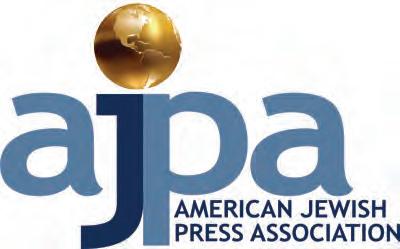
By Megan Trotter | TribLive
Community members last week launched a grassroots push to bridge cultural and neighborhood divides and curb hate.
The announcement of Stand For All Pittsburgh came during Pittsburgh’s fifth annual Eradicate Hate Global Summit, held at the David L. Lawrence Convention Center, downtown.
The introduction of the organization, sponsored by The Hear Foundation, comes after acts of political violence across the nation this year. They include the attempted assassination of Gov. Josh Shapiro by arson at his official residence in April, the assassination of Minnesota state Rep. Melissa Hortman and her husband in June, and — just last month — the assassination of conservative activist Charlie Kirk. In addition, there have been high-profile school shootings in Minneapolis and Denver since the beginning of the school year.
Now, Stand For All Pittsburgh organizers say, it is time to develop relationships that bridge divides.
Maggie Feinstein, executive director of the 10.27 Healing Partnership, who has worked with individuals and their loved ones impacted by the Oct. 27, 2018, attack at Tree of Life synagogue that killed 11 and wounded six, will act as a member of Stand for All’s Steering Committee.
“I believe that a lot of violence is motivated by a grievance narrative. We have to find somebody to blame for what doesn’t feel good in ourselves,” Feinstein said. “I think
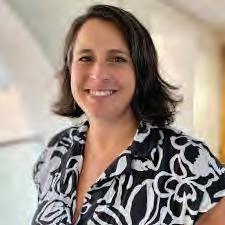
From Oct. 19 to 25, Stand For All will be hosting Pittsburgh’s first “United Against Hate Week,” which will have a range of programs across the community, educational programs, celebrations of diversity, ways to better understand hate and bias, and ways to learn how to respond.
Maggie Feinstein is a member of Stand For All’s steering committee
we have to figure out, how do we have less of that self hate?”
From Oct. 19 to 25, Stand For All will be hosting Pittsburgh’s first “United Against Hate Week,” which will have a range of programs across the community, educational programs, celebrations of diversity, ways to better understand hate and bias, and ways to learn how to respond.
The United Against Hate Week website has 20 suggestions for action, resources on how to respond to hate, toolkits for schools and local government, and more.
“Just as the events of 10/27 were a deeply moral, social, civic injury to this community … the events of the last week are civic injuries. I think that we hope to prevent that,” said Prabha Sankaranarayan, president and CEO of Mediators Beyond Borders International. “We hope coming together as a coalition will help us prevent those kinds of acts, because they are preventable.”
At a news conference, activist Leon Ford
USPS STATEMENT OF OWNERSHIP, MANAGEMENT AND CIRCULATION
b. (1) Mailed Outside-County Paid Subscriptions Stated on PS Form 3541: 985; 945
(2) Mailed In-County Paid Subscriptions Stated on PS Form 3541: 6,761; 6,702
Complete Mailing Address of Known Office of Publication and of
General Business Office of Publisher: Pittsburgh Jewish Chronicle, 5915 Beacon Street, 5th Floor, Pittsburgh, PA 15217-2005.
(9.) Publisher: Pittsburgh Jewish Publication and Education Foundation, 5915 Beacon Street, 5th Floor, Pittsburgh, PA 15217-2005. Editor: Toby Tabachnick 5915 Beacon St, 5th Floor, Pittsburgh, PA 15217-2005.
(10.) Owners: Pittsburgh Jewish Publication and Education Foundation, 5915 Beacon Street, 5th Floor, Pittsburgh, PA 15217-2005.
(11.) Known Bondholders, Mortgagees, and Other Security Holders Owning or Holding 1 Percent or More of Total Amount of Bonds, Mortgages, or Other Securities: None.
(12.) Tax Status: Has not changed during preceding 12 Months.
(13.) Publication Title: Pittsburgh Jewish Chronicle.
(14.) Issue Date for Circulation Data Below: 9/26/2026. (15.) Extent and Nature of Circulation: Average No. Copies Each Issue During Preceding 12 Months; No. Copies of Single Issue Published Nearest to Filing Date.
a. Total Number of Copies (net press run): 8,102; 8,012
(3) Paid Distribution Outside the Mails Including Sales Through Dealers and Carriers, Street Vendors, Counter Sales, and Other Paid Distribution Outside USPS: 0; 0.
(4) Paid Distribution by Other Classes of Mail Through the USPS: 0, 0.
c. Total Paid Distribution: 7,746; 7,647
d. (1) Free or Nominal Rate Outside-County Copies included on PS Form 3541: 0; 0.
(2) Free or Nominal Rate In-County Copies included on PS Form 3541: 0; 0.
(3) Free or Nominal Rate Copies Mailed at Other Classes Through the USPS: 0; 0.
(4) Free or Nominal Rate Distribution Outside the Mail: 350; 350
e. Total Free or Nominal Rate Distribution: 350; 350
f. Total Distribution: 8,096; 7,997
g. Copies Not Distributed: 25; 25
h. Total 8,121; 8,022
i. Percent Paid: 95.68%; 95.62%
I certify that 50% of all my distributed copies (electronic and print) are legitimate requests or paid copies.
(17.) Publication of Statement of Ownership for a Requester Publication is required and will be printed in the 10/03/2025 issue of this publication.
I certify that all information is true and complete: Jim Busis, 9/26/2025.
— co-founder of The Hear Foundation — reminded the crowd that he was shot five times by a Pittsburgh police officer during a 2012 traffic stop, a life-altering ordeal that pushed him to help train officers on cultural competency and press lawmakers to change use-of-force laws. He gestured behind him, to where Pittsburgh police Sgt. Eric Baker stood.
“You know me as someone who was a victim of violence, right? I was shot
five times by a Pittsburgh police officer,” Ford said. “We can model what healing and reconciliation looks because, unfortunately, violence does happen, and when it does happen, we have a choice to perpetuate violence … or to actually focus on healing and reconciliation.” PJC
Megan Trotter is a TribLive staff writer. She can be reached at mtrotter@triblive.com. This story originally appeared on TribLive.
Because of Achieva’s support services, Kim is living her best life.
At VaultArt Studio, Kim expands her creative skills and envisions a world of kindness, inclusivity, and harmony through her art.

By Tim Miller | Special to the Chronicle “Ready-made”
Sukkot is the only Jewish holiday that could conceivably be sponsored by Home Depot — or better, yet, Ikea. The requirement for a “frail, temporary structure” was ideal in the wilderness, and for different reasons has remained so, whether in the suburbs or the big city.
In the late 1950s, Zeiger and Farkas Corporation, on Marcy Avenue in Brooklyn, offered itself as the one-stop shop for “A New Model of Ready-Made Tabernacles.” “Waterand fireproof,” the ad promised. “Can be erected in 15 minutes. You can put the whole tabernacle together yourself — ready-made. Tools are not needed; hammer, nails, or screws are not needed.” As if to call each of these guarantees into doubt, however, the ad concludes with trepidation: “If you have complained about our last year’s tabernacles, we are ready to help you.”
Traveling to the Holy Land in the Middle Ages, Jews from Germany and Spain were astonished to come upon local Jews and Muslims pilgrimaging together to the grave of the prophet Ezekiel. Muslims often paid their respects at Jewish holy sites on their way to make Hajj, but the period from Rosh Hashanah through Sukkot was also a popular time.
At Ezekiel’s grave, Jewish leaders from the academies in Baghdad made an appearance, and Arab merchants set up shops. “On the holiday of Sukkot,” writes one traveler, “people come there from all lands … about sixty or eighty thousand Jews, in addition to Muslims.” Sukkahs were erected around

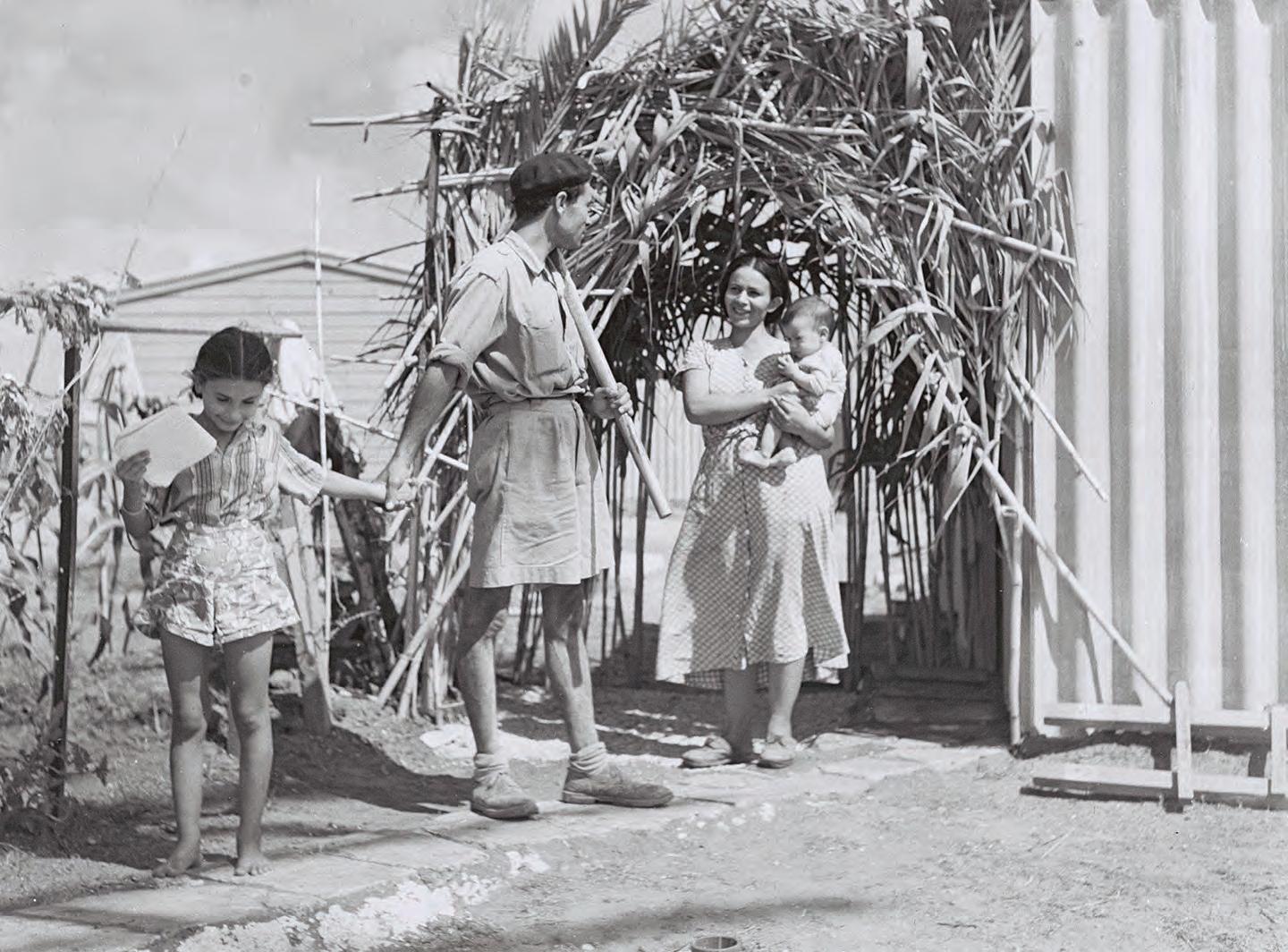
the prophet’s tomb, and vows and donations were made.
As one of the three pilgrimage festivals mentioned in the Torah, Sukkot sometimes received the highest honor of all and was referred to simply as he-Chag, “the Festival,” and it is the only one where we are commanded to be joyful. Its outsized importance has not lasted, however, for while all three pilgrimage festivals were associated with the agricultural year, Pesach and Shavuot have both taken on meaning beyond the growing earth — Pesach with the Exodus,
and Shavuot with the giving of the Torah. Sukkot, by and large, never went beyond its agricultural roots, and it remains difficult for anyone in a modern society to understand a religious festival that was primarily an act of relief and thanks for the securing of food for the coming year.
It is worth focusing, then, on one way that the ancient Israelites celebrated Sukkot after all the pilgrims from the surrounding country had arrived in Jerusalem. Beginning on the second night of Sukkot and continuing for each night after, the Water Drawing Ceremony took place. The sages were so attached to it that they declared, “Whoever did not see the joy of the Water Drawing Ceremony has not seen joy in his life.”
Mishnah Sukkah describes the ceremony, which took place in the Women’s Courtyard of the Temple: As night descended, four huge candelabras were set atop large poles, and a basin filled with oil was attached to each candelabrum. Strips were torn from the priests’ clothing and used as wicks and, once lit, “the light from the candelabra was so bright that there was not a courtyard in Jerusalem that was not illuminated from the light.”
gathered at Siloam was large enough that it was able to last (no miracle needed) for the remaining mornings of Sukkot.
As a harvest festival, the Water Drawing Ceremony was also a plea for rain in the new year, and a later mystical interpretation describes this process in more detail: After the water was poured on the altar, it “dripped down into a cavern that was under the altar. This cavern existed from the six days of Creation, and it went down into the very depths. When the angel in charge of water heard the water dripping down, he commanded the water reservoirs of heaven to give forth water, as well as those under the earth. In this way the water libation brought about abundant rain.”






For the rest of the night, dancing, music (“lyres, harps, cymbals, and trumpets, and countless other musical instruments”), and even the juggling of flaming torches by famous scholars, were all a prelude to what happened in the morning. Two priests were stationed above the courtyard with trumpets, and “When the rooster crowed at dawn, they sounded a tekia, and sounded a terua, and sounded a tekia.” These blasts continued as other priests went to the pool of Siloam to draw water, and returned with it to the Women’s Courtyard. A single priest now ascended the altar ramp, where two silver bowls were waiting. One was for wine and the other for the water just drawn. Each of bowls had holes on the bottom, and emptied out onto the altar below at the conclusion of the morning service. The amount of water
It’s hard not to dwell on these Israelites celebrating Sukkot so profusely, and to stay with them in their exuberance. They have no idea what the next 2,000 years will bring: for them, the Temple will always be there, and they will never know about the Mishnah and Talmud, about exile everywhere but also home in many of those places — North Africa, Spain, Amsterdam, Poland, England and the Ottoman Empire, America and finally Israel again; they will die before the Second Temple is destroyed, before pogroms and blood libels, before the Dreyfus affair and the Shoah, and before the current war; they will never read Maimonides or Rashi or Moses Mendelsohn or even a local Jewish newspaper; they will never know what a shtetl is, or Yiddish, or Pittsburgh. They’re still just back there, pulling another all-nighter on Sukkot. But then I think: What will Jews in another 2,000 years, looking back on our “ready-made tabernacles” — and, in a few months, our electric menorahs — say about us? What is waiting for us in our long future, that we can barely imagine? PJC
Tim Miller is a freelance writer living in Pittsburgh. He is online at wordandsilence.com.
By Zev Stub | The Times of Israel
The overall state of the Jewish people declined during the Jewish year that just ended, as the combined burden of Israel’s ongoing wars and global antisemitism harmed Jews’ resilience, cohesion and identity over the past 12 months, according to a report by the Jewish People Policy Institute think tank.
JPPI’s Annual Assessment of the Jewish People, published last week, found worsening or negative trends in almost all indicators regarding Israel and the Jewish people, in the aftermath of the Oct. 7, 2023, attack by Hamas against Israel.
The report was presented to President Isaac Herzog and the Israeli government last week against the end of the Jewish year 5785 and the backdrop of Rosh Hashanah, the Jewish New Year.
The assessment focused primarily on six gauges of Jewish well-being: demography, cohesion, geopolitics, resilience, identity and the Israel–U.S. relationship.
On the demographic front, Jewish communities around the world continue to grow, but Israel is losing more people to

relocation abroad than it is gaining through immigration, the report said.
Regarding internal cohesion, the unity that prevailed at the beginning of the war has given way to sharp polarization over political issues related to the war. Public trust in the government is at an all-time low, and the system of government is perceived as weak and unstable, the report said.
In terms of geopolitics, the Jewish people face exceptional challenges. Israel has not presented a coherent political vision for its war in Gaza, and post-Oct. 7 sympathy around the world has been replaced by harsh criticism and deepening diplomatic isolation, JPPI said.
With antisemitism on the rise, the Jewish people face physical attacks, social
exclusion and incitement on campuses and online at levels not seen in decades, JPPI said. International legal pressure, including International Criminal Court arrest warrants for Israeli leaders and moves by several countries to recognize a Palestinian state, represent a growing threat, the report noted.
Regarding Jewish identity, while many communities in the Diaspora have shown unprecedented levels of solidarity with Israel, among progressive youth, especially in the United States, there has been a noticeable distancing and even adoption of sharply critical, even anti-Zionist, positions toward Israel. Meanwhile, Israelis are strengthening their relationships with Diaspora communities, but tensions have increased around Israel’s political alliances with the far right.
Israel’s relationship with the U.S. is stronger than ever, as demonstrated by the joint operation against the Iranian nuclear program in June, the report said. However, political polarization in both countries threatens bipartisan support for Israel. An anti-Zionist wing is growing in the Democratic Party, especially among young people on campuses, JPPI noted.

Submit calendar items on the Chronicle’s website, pittsburghjewishchronicle.org. Submissions also will be included in print. Events will run in the print edition beginning one month prior to the date as space allows. The deadline for submissions is Friday, noon.
SUNDAYS, OCT. 5–DEC. 28
Join Chabad of Squirrel Hill for its Men’s Tefillin Club. Services and tefillin are followed by a delicious breakfast and engaging discussions on current events. 8:30 a.m. 1700 Beechwood Blvd. chabadpgh.com.
Join a lay-led online Parashah study group to discuss the weekly Torah portion. No Hebrew knowledge needed. The goal is to build community while deepening understanding of the text. 8:30 p.m. For more information, visit bethshalompgh.org/online-parashah.
q MONDAYS, OCT. 6-DEC. 29
Join Congregation Beth Shalom for a weekly Talmud study. 9:15 a.m. For more information, visit bethshalompgh.org.
Join Temple Sinai for an evening of mahjong every Monday (except holidays). Whether you are just starting out or have years of experience, you are sure to enjoy the camaraderie and good times as you make new friends or cherish moments with long-term pals. All are welcome. Winners will be awarded Giant Eagle gift cards. All players should have their own mahjong cards. Contact Susan Cohen at susan_k_cohen@yahoo.com if you have questions. $5. templesinaipgh.org.
WEDNESDAYS, OCT. 8–DEC. 31
Temple Sinai’s Rabbi Daniel Fellman presents a weekly Parshat/Torah portion class on site and online. Call 412-421-9715 for more information and the Zoom link.
Bring the parashah alive and make it personally relevant and meaningful with Rabbi Mark Goodman in this weekly Parashah Discussion: Life & Text. 12:15 p.m. For more information, visit bethshalompgh.org/life-text.
Join Chabad of the South Hills for Baby Loves Shabbat, music and movement for ages 0 to 3. Challah making and Shabbat songs. 3:45 p.m. 1701 Bower Hill Road. chabadsh.com.
THURSDAY, OCT. 9
Join Chabad of the South Hills for Seniors in the Sukkah. Enjoy holiday music, a special Sukkot program a delicious lunch, and shake the lulav and etrog. Presentation on Medicare and making the right Medicare choice for open enrollment. $5 suggested donation. 1 p.m. 1701 McFarland Road. chabadsh.com.
FRIDAY, OCT. 10
Bring a vegan dish to Temple David on Erev Shabbat Chol HaMoed for the Ninth Annual Vegan Sukkot Potluck in the sukkah and social hall. Services follow at 7:30 p.m. followed by a plant-based oneg Shabbat. This year we are honored to welcome speaker Michael Gribov, head of movement building at Jewish Vegan Life. Questions? Need recipe ideas? Contact Stan Beck at stanb@templedavid.org. Free. 6 p.m. 4415 Northern Pike.
SUNDAY, OCT. 12
Join Pittsburgh’s Jewish community for an Oct. 7 commemoration. Whether you come to mourn, to learn or to stand in solidarity, your presence matters. Security will be on site. 6:30 p.m. JCC Levinson Hall. For more information and to register, visit jewishpgh.org/event/october-7commemoration-2.

THURSDAY, OCT. 16
Chabad of Squirrel Hill presents Loaves of Love Women are invited to bake challah and sing songs of prayer with Sue Berman Kress and Julie Harris. $15. 7 p.m. 1700 Beechwood Blvd. chabadphg.com/lol.
SUNDAY, OCT. 19
Join the Rauh Jewish Archives and Classrooms Without Borders for a bus tour of Jewish heritage in the Monongahela Valley. Meet at Rodef Shalom before continuing to Charleroi, Brownsville and Donora. Lunch will be on your own at Brownsville. The tour will be facilitated by Eric Lidji, director of the Rauh Jewish Archives, and Kate Lukaszewicz of Classrooms Without Borders. $50. 8:30 a.m. cwbpgh.org/event/bustour.
The Pittsburgh Jewish Chronicle invites you to join the Chronicle Book Club on Zoom for its discussion of “Sons and Daughters” by Chaim Grade. 1 p.m. Email drullo@pittsburghjewishchronicle.org for registration link.
The Tree of Life presents “Antisemitism, an American Tradition.” Join New York Times columnist and 2013 Pulitzer Prize winner Bret Stephens in conversation with author and historian Pamela Nadell about her new book, which investigates the dark and long history of antisemitism in American life. Together, they will explore how understanding the past can help us stand up and fight back against hate. $0 (virtual); $125 (VIP). 4 p.m. Carnegie Mellon University, Jared L. Cohon University Center, McConomy Auditorium, 5032 Forbes Ave. Register at thetreeoflife.org.
TUESDAY, OCT. 21
“Hannah Arendt and the Jewish Question,” presented by Michael Moshe Milch. Free. 6:30 p.m. Carnegie Library of Pittsburgh, Squirrel Hill branch. No preregistration required.

designed to empower parents and guardians with skills, tools and confidence to support children with anxiety. Session is open to parents/guardians of school age children aged 7-18 still living in the home with a recognized anxiety disorder. Free. 1 p.m. Virtual through Zoom, link provided with registration. jfcspgh.org/event/lunch-learnsupportive-parenting-for-anxious-child.
WEDNESDAY, OCT. 29
The Holocaust Center of Pittsburgh presents “Voices from the Shadows — LGBTQ+ Experiences During the Nazi Era.” Eric Marcus introduces Making Gay History’s podcast series on the experiences of LGBTQ+ people during the rise of the Nazi regime, WWII and the Holocaust. Drawing on extensive research conducted for this first-ofits-kind audio documentary, Marcus shares archival clips during his presentation that brings this painful, often hidden history to life through the voices of the people who lived it. 6 p.m. Rodef Shalom Congregation, 4905 Fifth Ave. hcofpgh.org/event/ save-the-date-voices-from-the-shadows-lgbtqexperiences-during-the-nazi-era.
THURSDAYS, NOV. 6, JAN. 15, MARCH 12, APRIL 30, JUNE 25
In the ever-evolving landscape of legal practice, understanding the interplay between faith and governance is crucial for lawyers. Join Rabbi Danny Schi for an engaging CLE series that explores many intriguing questions. Individual classes: $45 with credit/$40 without credit. 8:30 a.m. Virtual. For a complete list of class dates and subjects visit, Jewishpgh.org/event.
WEDNESDAYS, NOV. 5-DEC. 10
WEDNESDAY, OCT. 22
Join JFCS for Lunch & Learn: Supportive Parenting for Anxious Childhood Emotions (SPACE)
The Pittsburgh Jewish Chronicle invites you to join the Chronicle Book Club for its Oct. 19 discussion of “Sons and Daughters,” by Chaim Grade.
From Amazon.com: “Originally serialized in the 1960s and 1970s in New York–based Yiddish newspapers, Chaim Grade’s ‘Sons and Daughters’ is a precious glimpse of a way of life that is no longer — the rich Yiddish culture of Poland and Lithuania that the Holocaust would eradicate. We meet the Katzenellenbogens in the tiny village of Morehdalye, in the 1930s, when gangs of Poles are beginning to boycott Jewish merchants and the modern, secular world is pressing in on the shtetl from all sides. It’s this clash, between the freethinking secular life and a life bound by religious duty — and the comforts offered by each — that stands at the center of ‘Sons and Daughters.’”
Your hosts
Toby Tabachnick, Chronicle editor
David Rullo, Chronicle senior staff writer
How it works
We will meet on Zoom on Sunday, Oct. 19, at 1 p.m.
What to do
Buy: “Sons and Daughters.” It is available at some area Barnes & Noble stores and
Join Chabad of the South Hills for a new JLI course, “The Kabbalah of Meaning,” exploring Jewish wisdom for finding the purpose that connects parts of life. No previous Jewish learning required. Online or in person. This course will satisfy the continuing education requirements of physicians, healthcare professionals, psychologists, social workers, LMFTs and LMHC/LPCs. 7:30 p.m. chabadsh.com. PJC www.pittsburghjewishchronicle.org
from online retailers, including Amazon and Barnes & Noble. It is also available through the Carnegie Library system.
Email: Contact us at drullo@pittsburghjewishchronicle.org, and write “Chronicle Book Club” in the subject line. We will send you a Zoom link for the discussion meeting. PJC
— Toby Tabachnick
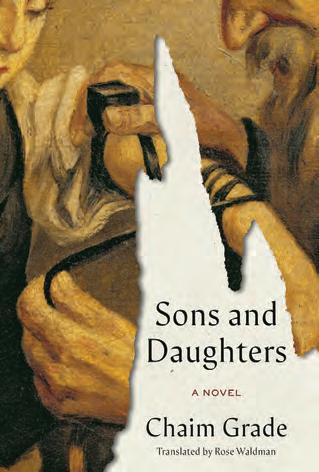

By Andrew Bernard | JNS
U.S. President Donald Trump and Israeli Prime Minister Benjamin Netanyahu announced a plan to end the war in Gaza, with a 72-hour deadline, which begins when Israel accepts the agreement, for Hamas to return the hostages whom it holds in Gaza.
Speaking at a press conference after the White House released the plan, Trump said that Hamas has not agreed to the proposal but that Arab and Muslim countries are negotiating with the terrorist group.
“We’re relying on the countries that I named and others to deal with Hamas, and I’m hearing that Hamas wants to get this done, too,” Trump said.
Trump said that if Hamas rejects the proposal, he will continue to support Israel’s war effort.
“If Hamas rejects the deal, which is always possible — they’re the only one left, everyone else has accepted it — but I have a feeling that we’re going to have a positive answer,” Trump said. “If not, as you know, Bibi, you’d have my full backing to do what you would have to do.”
The plan calls for an immediate ceasefire, phased Israeli withdrawal from most of Gaza, Hamas releasing Israeli hostages in exchange for the Jewish state releasing nearly 2,000 Palestinian prisoners, amnesty for Hamas members who lay down arms and creating a “technocratic, apolitical Palestinian committee” to govern Gaza on a transitional basis.

It largely conforms to prior media reports about the proposal, except that it does not include an Israeli pledge to refrain from carrying out airstrikes against Qatar. Netanyahu made that promise orally in a phone call with Qatar’s prime minister earlier on Monday, in which he also apologized for violating Qatari sovereignty in the Sept. 9 bombing, according to a White House readout of the call.
‘UNRWA can’t come back’
Richard Goldberg, senior adviser at the Foundation for Defense of Democracies, told JNS that the plan includes both things that would occur quickly and concretely — like releasing the hostages within 72 hours

— and longer-term items, like reforming the Palestinian Authority.
“The top-line principles of the deal are exactly in line with Israel’s stated war goals, demands, priorities and interests,” Goldberg said. “How does it actually all happen? There are a million ways this
could all go bad.”
“How do you actually deradicalize the Gaza Strip?” he said. “How do you actually ensure that it becomes a terror-free zone long term? Who will be participating in this international security force?”
Other questions include “how will you ensure the United Nations is not continuing to provide services, money, aid, equipment to members of Hamas or other terror organizations that are not recognized as terror organizations by the United Nations?” Goldberg said. “How do you deradicalize if the Qataris are at the table, having been longtime sponsors, financiers of Muslim Brotherhood ideology and the radicalization that obviously has already taken place?”
“These are all important questions that we’re going to have to address,” he told JNS.
The plan calls for aid distribution in Gaza via the United Nations “and its agencies” to “proceed without interference.” It does not say what role, if any, the United Nations Relief and Works Agency — the U.N. Palestinian aid agency that Israel banned in January over its alleged ties to Hamas — will play in a future Gaza.
When my 77-year-old mother was badly injured and in the hospital for months, I had no idea how we’d manage her health coverage. Stephanie Davis stepped in, guided us through every step, and made the impossible feel possible. I will be forever grateful for her compassion, expertise, and determination.




Asaf Elia-Shalev | New York Jewish Week
When Will Eastman, a fundraiser for Jewish camps in New Jersey, recently sought to transfer his daughter, the eldest of four children, from public school to a Jewish day school, his immediate reaction was “sticker shock.”
“The minute we walked in the door, it was $27,000 for kindergarten at one place and $17,000 at another,” he said.
The tension between the desire for Jewish education and the crushing price tag is what UJA-Federation of New York is aiming to relieve with a new three-year $15 million pilot fund to help cover day school tuition. The program, announced this week, will provide grants of up to $20,000 per student for middle-income families and Jewish communal professionals in New York City, Westchester and Long Island.
Even though his family is outside UJA’s catchment area, Eastman said “we should be happy for others — hopefully this starts a domino effect in other federations.”
The money comes from what UJA calls its “surge” fund, part of a national Jewish Federations campaign to respond to a wave

of post–Oct. 7 engagement in Jewish life.
Across North America, federations have used the “surge” label to describe a spike in demand for Jewish schools, camps and synagogues, and they are investing extra
Pamela Nadell in conversation with Bret Stephens
Sunday, October 19, 2025 // 5:00 PM Carnegie Mellon University, Jared L. Cohon University Center, McConomy Auditorium
5032 Forbes Avenue, Pittsburgh, PA, 15213
Join author and historian Pamela Nadell in conversation with New York Times columnist and 2013 Pulitzer Prize winner Bret Stephens about her new book: Antisemitism, an American Tradition. They’ll discuss the long history of antisemitism in American














dollars to meet it.
Applications open in mid-November for awards that begin with the 20262027 school year.
In interviews, UJA leaders and field experts cast the program as both a response to a surge of Jewish engagement since Oct. 7 and a test case they hope to scale.
“There’s a receptivity to day school education among a broader segment of the community,” UJA CEO Eric Goldstein said. “In this moment of opportunity … we’re trying to remove barriers that keep families from choosing a Jewish school.”
The pilot offers $15,000 per child per year (capped at $30,000 per family and up to 50% of tuition) for communal professionals with K–12 students enrolled at one of 54 participating schools in New York City, Long Island and Westchester County.
A second “transfer” track provides up to $20,000 per child for grades 6-12 (capped at $40,000 per family and up to 50% of tuition) for first-time day school families moving from public or independent private schools.
According to the 2018–2019 Avi Chai Foundation census of Jewish day schools, about 20% of Jewish school-age children in the U.S. are enrolled in Jewish day schools, and of those students, around 90% attend Orthodox schools.
Across the country, affordability has become the defining challenge for Jewish day schools, sparking experiments in philanthropy and communal funding.
From Cleveland, where the Mandel Foundation recently committed $90 million to a system-wide transformation effort, to Toronto’s Generations Trust and the Jewish communal professional subsidy in Atlanta, federations and foundations are treating tuition relief as a strategy to stem attrition and grow enrollment.
New York’s pilot represents the largest such initiative in the nation’s biggest Jewish community, and leaders say they hope it will become a model others replicate.
Awards are administered by the Hebrew Free Loan Society, paid directly to schools and coordinated with school-based financial aid. UJA says the application will include a research component to gauge impact on school enrollment and the recruitment and retention of Jewish communal workers.
Goldstein said average grants of $15,000$20,000 could reach “somewhere between 150 and 200 students” during the pilot.
He said UJA is tapping two sources: an endowment-backed post–Oct. 7 allocation to meet “the surge” in Jewish engagement — a term adopted by Jewish groups across the country to describe fuller synagogues, stronger program participation, and renewed interest in learning and identity — and its regular Jewish Life grants. UJA hopes early results will justify raising additional funds.
“Let’s see what the pickup is — our real hope is that we will significantly scale this beyond the pilot,” Goldstein said.
School leaders greeted the announcement as consequential for affordability, morale and messaging.
“It was really encouraging,” said Rabbi Bini Krauss, head of school at SAR Academy, a Modern Orthodox private school in the Bronx. “For communal professionals, even after a school’s financial aid, there can be a big gap. In New York, it’s really hard to make it work without additional support.”
Krauss said he expects strong demand among Jewish professionals and believes the transfer track could nudge new families to enroll. He praised UJA’s attempt to separate its scholarship from school aid so the dollars don’t simply displace existing packages.
“That’s why it’s a pilot — they’ll have to work through details — but the individual grants are significant enough to matter,” he said.
At progressive and pluralistic Hannah Senesh Community Day School in Brooklyn, head of school Nicole Nash called the fund
Syracuse students charged with hate crime after pork thrown into Jewish frat on Rosh Hashanah
Two Syracuse University students face hate crime charges for allegedly throwing pork into a Jewish fraternity house on Rosh Hashanah, JTA reported.
At around 6 p.m. Tuesday, members of the Zeta Beta Tau fraternity were gathered for Rosh Hashanah when one student, who was not affiliated with the fraternity, allegedly entered the house and threw a bag of pork at an interior wall, according to university police.
The student, identified as Samuel Patten, 18, of Brooklyn, then fled the home in a vehicle driven by another student, Kyle Anderson, 18, of Greenwich, Connecticut. They were later captured by police and charged with burglary as a hate crime and criminal nuisance.
Onondaga County District Attorney William Fitzpatrick told the Associated Press that the hate crime charges for the students came about because the incident occurred on a Jewish holiday at a historically Jewish fraternity.
“This incident is not a foolish college prank and will not be treated as such,” Fitzpatrick told the Associated Press. “It will be treated for what it is, a crime directed against a group of Jewish students enjoying a celebratory dinner and seemingly secure in their residence.”
Syracuse University has an undergraduate Jewish population of about 2,500, comprising around 16% of its student body, according to Hillel International. In 2019, a Jewish professor received an anonymous, antisemitic email and all fraternity activities were cancelled the same year following a spate of racist incidents.
‘Deeply regrettable’ UN held briefing on Rosh Hashanah, US envoy says Mike Waltz, the U.S. ambassador to the United Nations, said at a U.N. Security Council briefing on the Middle East last week that it is “deeply regrettable” that the council decided to hold the high-level “briefing on Gaza on Rosh Hashanah, the Jewish New Year, knowing full well that that decision excludes Israel,” JNS reported.
“Frankly, colleagues, it’s a testament to how this council has prioritized a lot of performance over serious efforts to actually advance peace,” Waltz told the council.
United Nations tends to mark holidays that are not Jewish and to wish followers happy holidays.
Both the main United Nations socialmedia handle (with 16.4 million followers) and that of António Guterres, the U.N. secretary-general (with 2.4 million followers), failed to note Rosh Hashanah on social media this year.
Danny Danon, the Israeli ambassador to the United Nations, stated on Monday before the holiday that “Israel will not participate in tomorrow’s Security Council session.”
“Despite our prior notice that the session falls on Rosh Hashanah, the council chose to hold the debate precisely on this day,” he wrote to the council president. “A one-sided discussion held on a Jewish holiday is yet more proof of the U.N.’s hypocrisy.”
Tucker Carlson tells story about murder of Jesus at Charlie Kirk’s memorial, igniting criticism
Tucker Carlson, the far-right personality who has repeatedly drawn criticism for
Oct. 6, 1914 — Jewish aid reaches Palestine
promoting antisemitic conspiracy theories, recounted the plot to murder Jesus during his speech at the memorial service for Charlie Kirk, JTA reported
Both supporters and critics said they believed Carlson was implying that Jews or Israelis had been behind Kirk’s assassination last month — amplifying a prominent conspiracy theory that Israel killed Kirk because his longstanding support was eroding.
The theory advanced by far-right influencers gained so much traction that Israeli Prime Minister Benjamin Netanyahu publicly denied the allegations twice, first while being questioned on NewsMax, a far-right TV network, and again in a video address that he posted online.
Carlson has flirted openly with the theory but did not mention Netanyahu, Israel or the Jews explicitly during his speech at Kirk’s memorial, which included a who’s who of contemporary conservatism and married the stylings of a political rally and a religious revival.
Instead, Carlson likened Kirk to Jesus — and his assassin to those who killed the man worshipped by billions of Christians. Recounting what he said was “my favorite story ever,” Carlson said.
For many listening, including right-wing Jews who admired Kirk, the link between the story and the contemporary allegation against Israel was clear.
Some Jewish voices said Carlson, who laughed as he told the story, was invoking antisemitic ideas that have long fueled Christian violence against Jews.
It was not only Jews drawing the connection: The Quds News Network, a Palestinian
network, meanwhile, tweeted a video of the speech with the description, “Tucker Carlson suggests Israeli involvement in Charlie Kirk’s death during TPUSA’s memorial for its late founder.”
Trump admin bars Iranian diplomats from shopping at wholesale stores in US
The Trump administration has officially barred Iranian diplomats based in or visiting New York from shopping at wholesale stores, such as Costco and Sam’s Club, without prior authorization, the U.S. State Department stated last week, JNS reported.
Under the new regulations, Iranian diplomats and their dependents must obtain approval from the department to shop at wholesale retailers. This includes permission to purchase luxury goods valued at over $ 1,000 and vehicles costing more than $60,000.
The only country whose diplomats were specifically targeted by the U.S. government is Iran, according to the Associated Press. Iranian diplomats are known to shop at such wholesalers to purchase items in bulk and at discount rates that aren’t available back home due to sanctions and other economic restrictions.
While the new U.S. restrictions were announced as the Iranian delegation and other world leaders gathered in New York for the 80th session of the U.N. General Assembly, they will permanently apply to any Iranian diplomats representing their country at the United Nations, AP reported. PJC
— Compiled by Toby Tabachnick


Items are provided by the Center for Israel Education (israeled.org), where you can find more details.
Oct. 3, 2018 — Chancellor Merkel visits Israel
German Chancellor Angela Merkel arrives in Jerusalem for the first time in more than four years amid growing U.S.-Europe tensions over Iran. She seeks to salvage the 2015 Iran nuclear deal, opposed by Israel.

Oct. 4, 1992 — El Al 747 crashes
El Al Flight 1862, a 747 carrying cargo from New York to Tel Aviv, crashes into an apartment complex in Bijlmermeer, Netherlands, 16 minutes after taking off from Amsterdam, where the plane had stopped for a crew change.
Oct. 5, 1898 — Painter Nachum Gutman is born
Painter Nachum Gutman is born in what is now Moldova. At 7, he moves to Ottoman Palestine. Gutman paves the way for Israeli artists, writers, painters and sculptors to move away from European influences.
Gold worth $50,000, raised in two days by American Jewish leaders in response to a plea from Henry Morgenthau, arrives in Jaffa on the USS North Carolina to help the Jewish community in Palestine.
Oct. 7, 2009 — Crystallographer Yonath wins Nobel
Crystallographer Ada Yonath, a professor at the Weizmann Institute, becomes the first woman from the Middle East to win a science Nobel Prize when she shares the chemistry award for work on ribosomes.
Oct. 8, 1576 —
Sultan ousts Jews from Safed
Ottoman Sultan Murad III orders 1,000 “rich and prosperous” Jews in Safed to move to Famagusta, Cyprus, to spur economic development on the island. The Ottomans move 500 more Jewish families in 1577.

p Ottoman Sultan Murad III hoped to spur economic development in Cyprus by forcing Jews from Safed to move there.
Oct. 9, 1917 — Spy Sarah Aaronsohn dies after capture Sarah Aaronsohn, part of the Nili spy network for the British in Ottoman Palestine, dies eight days after being captured by Turkish authorities and four days after shooting herself to end her torture and interrogation. PJC





























Continued from page 1
On Sept, 23, 1943, as the ghetto’s final liquidation began, the library was forced to shut down. Most ghetto residents were killed at the nearby Ponary Forest.
By late 1944, as many as 75,000 people were murdered at Ponary, “the vast majority of them Jews,” according to the U.S. Holocaust Memorial Museum.
Standing near a memorial in the wooded area, CWB participants listened to “Shtiler, Shtiler,” a Yiddish song, whose translated lyrics begin, “Quiet, quiet, let’s be silent, dead are growing here.
They were planted by the tyrant, see their bloom appear. All the roads lead to Ponary now, there are no roads back. And our father too has vanished, and with him our luck.”
“I love trees,” seminar participant Veronique Sriqui, 68, told this reporter. “But I think I’m never going to look at trees the same way.”
On the road again
For much of the nearly two-week trip, CWB travelers moved between sites by bus.
After visiting the Rudninkai forest, 15 miles south of Ponary, seminar participants saw grass-covered bunkers once occupied by partisans. At their “height,” Irens said, there were fewer than 1,000 partisans.
Understanding an unimaginable time can only begin by “visiting the sites,” Gur said.
In Kaunus, Lithuania’s interwar capital, seminar participants explored the city’s Jewish heritage. Mario Czonstkowsky, one of several lay leaders and CWB board members on the seminar, noted, “This is the place that my mother, my grandparents and my family were part of.”
Standing on his mother’s former street, Czonstkowsky, 70, recalled her being “very kind” and a “beautiful woman” who struggled with hunger, as did many Kaunus residents at the time.
Czonstkowsky said his mother told him that despite hardships, the city had a “strong Jewish community.”
After crossing the road beside his wife,
millennia was that in 256 CE, a decade after they were created, a Roman garrison filled the synagogue with dirt in an effort to fortify the city against an impending, and ultimately successful, invasion by Sasanian Persians, Joshowitz said.
“There were probably more than 50 panels originally, but only the ones that were fully buried survived, and it was the unexpected consequence of a military strategy.”
Dura-Europas was located on an escarpment above the Euphrates River, making it a strategic trade as well as military center.
The synagogue paintings provide insight into how Jews understood the Bible and expressed their faith in their polytheistic town during a peaceful period, Joshowitz said. “The paintings were a celebration of their Jewish identity and heroes and role models.”
Moses figures prominently in many of the images and his importance is depicted by his garb and height, she said. “One of the most striking scenes shows Moses leading the Israelites out of Egypt.”
“The figures aren’t proportionate to one another and size was used to convey a person’s significance.”
God is not depicted in human form and is illustrated, instead, as an outstretched arm, taking action, in the upper register of a panel, Joshowitz said.
It isn’t known who the painters were since
Rebeca Czonstkowsky, and FaceTiming relatives, Mario Czonstkowsky said it was important to tell his family about his visit to Kaunus, “to let them know that we were here.”
In Riga, Latvia, guide Lena Shpungina, described a recent history similar to Lithuania’s.
Latvia declared independence in 1918, however, Soviet and German occupation followed. After World War II, and another spell of Soviet occupation, Latvia again declared independence in 1991. Since the early 1990s, Riga has experienced a small rebirth of Jewish life, but the growth comes after a bygone existence was largely obliterated then erased again.
Standing near the Old Jewish Cemetery, which operated between 1725-1920, Shpungina said at the end of August 1941 local newspapers published notices of a ghetto being opened near the site.
By October 1941, 30,000 Jews were imprisoned there.
The ghetto was the “poorest part of the city,” Shpungina said. “For ghetto prisoners, there was no medicine, no equipment … only one food store, one public bath house. Jews were not allowed to go to cinemas or theaters after the Nazis took control.”
In late November and early December 1941, Germans announced ghetto residents would be resettled “further east,” according to the U.S. Holocaust Memorial Museum. Within weeks, German SS, police units and Latvian aids shot at least 25,000 Jews in the nearby Rumbula forest.
“There were different rumors in the ghetto about what was waiting in the forest,” Shpungina said. “By the time they got there, they could hear the shooting.”
In 1944, to destroy evidence, Germans forced prisoners to reopen mass graves and burn bodies. The Germans then killed the prisoners. The Soviet army liberated Riga on Oct. 13, 1944. Nearly every local Jewish resident had been murdered. The Old Jewish Cemetery,
were Jewish … but only one member of the family had a siddur (prayer book).”
He was from Poland, she added. “After 1991, Jewish life here changed. Our kids had different options than we had.”
Get your education
Inside the JCC Riga, director Inna LapidusKinbere described a slew of in-house programs, nearby Jewish camps and two Jewish schools.
“After the break from Soviet times, we’re trying to rebuild,” she said. “We’re doing it step-by-step.”
Similar tactics and sentiments were expressed by communal leaders and JCC staff in Tallinn, Estonia.
Upon greeting seminar participants at Beit Bella, a modern synagogue boasting large glass windows and open spaces, Rabbi Efraim Shmuel Kot likened Tallinn’s community to a shofar.
“It started out narrow but step-by-step, it’s growing,” he said before sounding the ram’s horn in honor of the approaching Jewish new year.
Among 1.3 million Estonians, about 2,000 are Jewish. Engagement rates, according to the JCC, are “higher than anywhere else in the Baltic states.”
The JCC’s youth center welcomes 360 kids and teens for weekly activities and camping experiences. The Tallinn Jewish School has 365 students. A private Jewish kindergarten has 45 students. Beit Bella has 150 members.
More than 1,000 adults participate in one of nearly 250 events per year.
Efforts are made to support the welfare center’s 500 clients, but the community’s focus is on raising the next generation of Jews, JCC director Irina Shlick, 40, said. “Informal education here is their path to a Jewish life.”
During both weekly and holiday programs, Shlick and her small staff work with mental health professionals to ensure the city’s Jewish adolescents feel safe and welcome.
kosher bakery in the basement of the Helsinki Synagogue, Chaya Votkin, 52, shared her vision for community: “I want to see this place as a home for everyone.”
Votkin, who was elected president of the Jewish Community of Helsinki in May, spoke to this reporter over the clamor of numerous nearby activities. Within earshot a volunteer welcomed visitors to the library, parents discussed an upcoming trip to Israel for students at The Jewish Community School of Helsinki, challah bakers prepared Shabbat loaves in memory of the mother of the community’s rabbi, adults studied Hebrew or reviewed rabbinic texts, and a choir of Jewish and non-Jewish singers practiced Yiddish songs.
The hubbub, which continued the following evening when teens used the space for a BBYO meeting, follows the community’s biggest question, Votkin said: “How do you create engagement and ownership?”
Helsinki has fewer than 1,000 Jews.
Votkin, the first woman to lead the community in nearly 175 years — she’s also observant and a convert — offered a message leaders beyond Finland would recognize: “I just want to encourage people to take initiative, to take responsibility.”
Shortly before leaving Helsinki on Sept. 18, Gur said the Jewish story can’t be understood without tracing its path.
Curricula addressing the Holocaust or European Jewry often only include references to “Auschwitz and Poland.” There’s little mention, she said, of post-war Soviet life and the “struggles” and strengths experienced today.
Classrooms Without Borders plans on offering a similar seminar in 2027. Founded in 2011, the organization has taken hundreds of educators abroad to help strengthen their instructional tools.
“This is the place to create and express Jewish identity,” she said. And in order to maintain a “sustainable community, it’s
Seated inside Cafe Kesher, a newly opened

the worshippers’ vision, and I speculate that they weren’t necessarily Jewish,” she said. “The congregation had to have had assets to commission a wall painting program. It would not have been inexpensive.”
It wasn’t until the 1930s that the panels were discovered during an archaeological dig at the Dura-Europos Synagogue site. They were later moved to the National Museum in Damascus where a replica of the synagogue was built to contain them.
“There was an effort at that time to create a national museum,” Joshowitz said. “The DuraEuropos panels were among the archaeological artifacts this new museum acquired.”
They were kept behind heavy doors for decades and their fate during Syria’s civil war, which began in 2011 and ultimately led to the fall of the Bashar al-Assad regime in 2024, was unknown, said Joshowitz, who traveled to Syria
“I figured it might be the best day of my life, or the worst day. I thought maybe the paintings had been removed. But I wanted to find out.”
Her two-day trip in September was facilitated by Rabbi Asher Lopatin, director of community relations of the Jewish Federation of Ann Arbor, Michigan, and Joe Jajati, grandson of a former leader of Syria’s Jewish community and founder of the Syrian Mosaic Foundation.
Lopatin had visited Damascus in February, about two months after the fall of al-Asad, and was part of the first Jewish delegation to put foot on Syrian soil in more than 30 years.
In a conversation with Joshowitz, he expressed an interest in returning to Syria specifically to see the paintings, and asked if she wanted to join his delegation.
“It was a risk, not knowing what we’d find,” she said. “But I was willing to take it, whether we’d find them intact, or disassembled or destroyed. It was worth knowing.”
“Teachers don’t travel. They teach in a box. Educators and students must know more,” Gur said. “They need to understand this is the place.” PJC
Adam Reinherz can be reached at areinherz@pittsburghjewishchronicle.org.
She said she was “absolutely thrilled” to see that they were there and in good hands.
Although the group was given about 40 minutes to view the panels, Joshowitz requested, and was granted, more time. Artifacts from a later temple, the Jobar Synagogue, also were shown to the delegation.
A native Pittsburgher, Joshowitz earned her doctorate in Judaic studies from New York University in 2023 after studying biblical art of the eastern Mediterranean. She was a Fulbright Scholar at Hebrew University and received research fellowships that supported her ability to go to archaeological sites in Israel and Turkey while pursuing her PhD.
She is scheduled to lecture on the paintings at the University of California, Irvine, in November, and said she would welcome an opportunity to give similar talks in her hometown.
While the panels are of great scholarly inquiry, Joshowitz is hopeful that press and social media coverage generated by the recent trips will pique popular interest, as well.
“We have a lot to learn from these paintings, including how ancient Jews understood the Bible,” she said. “What are the stories they thought were valuable, compared to what modern Jews think are valuable?”
Replicas of three Dura-Europos panels can be seen at the Israel heritage room at the University of Pittsburgh nationality rooms. PJC
Deborah Weisberg is a freelance writer living in Pittsburgh.
Report:
Continued from page 5
“This is a troubling and alarming report with many challenges definitely following October 7 and the impact on Jewish communities all over the world,” Herzog said upon receiving the assessment. “What’s most important for us is Jewish resilience, the ability of all communities to function and flourish amidst these challenges, and of course, keep the centrality of Israel in their heart and in their deeds, and most importantly, to see our hostages back home and an end to the war.”
JPPI offered a number of strategic recommendations for Israel to counter these trends. These include defining a clear political objective
Gaza:
Continued from page 7
Goldberg said that UNRWA continuing to have a role in Gaza would undermine efforts to deradicalize the Palestinian enclave.
“UNRWA can’t come back,” he said. “What does it mean to have the United Nations in some sort of leading role in the delivery of
Tuition:
Continued from page 8
“a true game-changer,” especially as families seek “places of connection and belonging.”
She underscored the size of the awards and said the income ceiling at $350,000 is meaningful for middle-income New Yorkers who often fall through aid gaps.
“It models a paradigm shift: incentives plus support that help us open our doors wider,” Nash said.
Beyond New York, advocates hope the pilot will spur copycat efforts.
Eastman, chief development officer at NJY Camps and the author of an op-ed in January arguing for tuition-free Jewish day schools, said he views the fund as well-targeted and catalytic.
“Investing in people who already opted into Jewish life with their careers is very smart,” he said.
Eastman said affordability is the “big-ticket item,” but he urged philanthropy to pair aid with excellence: better facilities, stronger programs and top educators.
“We don’t want very affordable, ‘OK’ schools,” he said. “We need excellent schools that are also Jewish.”
That linkage — affordability and quality — is central to how national day school groups read the landscape.
“Israel stands at a crossroads: Massive security achievements have opened a regional window of opportunity, but without a political horizon and without addressing the internal crisis, the country risks sliding into prolonged strategic isolation.”
—YEDIDIA STERN
for the “day after” in Gaza, restraining extremist rhetoric in government, and reforming Israel’s system of government, including resolving the issue of ultra-Orthodox military
aid and services, and how does that align with the stated objective of a Gaza that is self-sufficient for the Gazan people who would also de-radicalize? UNRWA cannot deliver on either of those.”
Netanyahu said that the Israeli cabinet has approved the proposal, which he said is the “day-after” plan for Gaza.
conscription. Israel should also launch proactive diplomatic initiatives toward Europe, Asia and moderate Arab states, and integrate Diaspora Jewry into Israel’s decision-making
“Hamas will be disarmed, Gaza will be demilitarized, Israel will retain security responsibility, including a security perimeter for the foreseeable future,” the premier said. “Gaza will have a peaceful, civilian administration. That is run neither by Hamas nor by the Palestinian Authority.”
The transitional Palestinian committee to govern Gaza will be overseen by a “board of peace,” which Trump is to chair, and whose
“Affordability is part of a virtuous cycle. If you invest in aid and in talent and leadership, schools become more excellent; more families enroll; budgets strengthen; and you can reinvest again.”
–PAUL BERNSTEIN
Paul Bernstein, CEO of Prizmah: Center for Jewish Day Schools, called UJA’s move “very significant,” noting that New York is the sector’s largest market.
Bernstein pointed to Atlanta’s communal-professional scholarship model as a precedent. Subsidies there did more than lighten family burdens; by freeing up school aid budgets, they were reinvested in quality, which in turn supported enrollment growth.
“Affordability is part of a virtuous cycle,”
Bernstein said. “If you invest in aid and in talent and leadership, schools become more excellent; more families enroll; budgets strengthen; and you can reinvest again.”
Bernstein said the COVID period offered an unexpected case study: Families who sampled day schools for practical reasons — local public schools were closed — often reassessed the value of the “product” once inside and stayed. Still, he cautioned that
affordability in high-cost cities is a tangible barrier that cannot be wished away. Asked whether the field should aim for “tuitionfree,” he called it a worthy aspiration but said targeted subsidies layered with other investments are the realistic path forward now.
For UJA, the pilot also doubles as workforce policy. The communal-professional track requires three years of cumulative service across UJA’s 67 core partner organizations and is designed, in part, to bolster morale and retention. (JTA’s parent organization 70 Faces Media is one of the partners.)
The eligible school list mirrors the participants of UJA’s long-running Fund for Jewish Education, which historically subsidizes teacher benefits and training — a choice intended to ensure participating schools already have a stable financial relationship with UJA.
through regular institutionalized forums, JPPI said.
Additional recommendations include developing a national plan to combat antisemitism, fostering ties with the Israeli Diaspora through civil society and creating international study tracks at Israeli universities to attract Jewish students.
“Israel stands at a crossroads: Massive security achievements have opened a regional window of opportunity, but without a political horizon and without addressing the internal crisis, the country risks sliding into prolonged strategic isolation,” said JPPI president Yedidia Stern. “The key challenge is to restore public trust and create a new social compact, based on a fair distribution of b urdens and pragmatic constitutional reform.” PJC
members are to include Tony Blair, a former U.K. prime minister.
The plan envisions the Palestinian Authority replacing both entities eventually.
The plan leaves the possibility of a Palestinian state open in the future, even as Trump said that several countries had “foolishly” recognized such a state and noted that Netanyahu said he was deeply opposed to it. PJC
A special-cases committee will review borderline situations: for example, applicants just over the income limit or whose schools are seeking to join the eligible network. Awards will be first-come, first-served with an internal equity review aiming to balance geography and school types, according to Hannah Kober, UJA’s director of day school strategy.
“We want to make sure that we are really offering this program to the broadest segment of the community as we can under these circumstances,” Kober said during an online briefing last week.
Goldstein stressed that day schools are “not the only” pathway to Jewish engagement, citing camps, synagogues and Jewish community centers, but said the research is clear about their long-term impact on literacy and identity.
“Our greatest hope is that it’s fully subscribed,” he said of the pilot. “Then we can do what we can to scale.”
Krauss, the SAR head, framed success similarly: not just more seats filled, but a message to young professionals considering careers in Jewish life that the community will stand behind their families. “Call it a scholarship if you want,” he said, “but I think of it as the Jewish world supporting the people who support the Jewish world.”
Nash, at Senesh, put it another way. “You can say something is a priority,” she said. “This is UJA investing like it is.” PJC

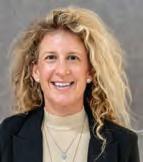
On Saturday evening I encountered activists from Jewish Voice for Peace next to the Squirrel Hill Night Market. They were engaging people with talking points that vilified Israel and pushed for a U.S. arms embargo.
JVP describes itself as an “anti-Zionist organization” and has a history of promoting campaigns and political agendas that fuel hatred and conflict, rather than justice and peace. Its materials frame false accusations of “genocide” and “intentional starvation” as undeniable truths; promote the boycott divest sanction (BDS) campaign, which aims to eradicate Israel; and characterizes the eliminationist slogan “from the river to the sea” as a call for “equality and freedom.” JVP blames Israel alone for Palestinian suffering and ignores the destructive actions of Hamas and the Palestinian Authority.
I spoke to a few of the JVP members, challenging their claims with facts about Hamas ruthlessly militarizing civilian areas all over Gaza and Israel’s efforts to avoid harming civilians. While we agreed that the Oct. 7, 2023, massacre was horrific, the JVP representatives held Israel solely responsible for the suffering of the Palestinians, insisted on calling all of Israel “occupied Palestine,” denied any link between anti-Zionism and antisemitism, and refused to acknowledge Israel’s right to self-defense. Their materials even made the misleading claim that stopping U.S. aid to Israel could feed millions of Americans — a false and libelous assertion about budget allocations and the U.S.Israel relationship.
I am sharing what I heard — and what I didn’t — because this misleading messaging is not fact-based and inverts reality. Many people, including our children, encounter these claims regularly, and we owe them facts and context.
Genocide is a legal term requiring proven intent to destroy a people because of their ethnic or national identity. Israel’s objective is to defeat Hamas and free the hostages. Its military has been forced to carry out this objective in an urban battlefield where an openly genocidal terrorist group spent 16 years ruthlessly militarizing Palestinian homes, schools, mosques and hospitals. Instead of protecting its people, Hamas puts them directly in harm’s way and then exploits their suffering through false claims of genocide. Meanwhile, Israel has sent millions of warnings to Palestinian civilians, urging them to evacuate war zones. It has put its own troops in danger by sending them to fight house to house across Gaza. And it has launched dozens of investigations into the actions of its own soldiers during this war.
or unable to deliver it to all civilians in need. Israel responded to this crisis by pausing many military operations and dramatically expanding deliveries of food, water and medical supplies.
This context doesn’t make the suffering of Palestinian civilians any less horrific. What it should do is change the actions of those who want to help end the devastation caused by the Oct. 7 war. As even Arab leaders begin to openly state that Hamas must lay down its arms and relinquish control of Gaza, all people of good will must focus on making those words a reality.
Far too often, we see anti-Israel activists, including a small minority within the Jewish community, hiding behind “anti-Zionism” to avoid accountability. Criticizing Israeli policies is legitimate. However, anti-Zionism — an effort to strip away the rights of Jewish people
We cannot allow our story to be inverted or Israel to be demonized, delegitimized, or held to a double standard by anti-Zionists.
Accusations of “intentional starvation” ignore the fact that Israel has helped deliver over 2 million tons of aid into Gaza since it was attacked by Hamas on Oct. 7, 2023. Some focus on a period from March to May, 2025, when Israel cut off aid in order to put a new system in place aimed at stopping Hamas from stealing food and other supplies. Two key facts are left out to promote big lies about Israel. First, from Jan. 19 to March 1, 2025, Israel helped deliver 307,908 metric tons of food to Gaza — enough to feed everyone there for up to five months. Second, the BBC and other media outlets confirmed that Hamas uses aid to fuel its war machine, including by taking food that is supposed to be free and selling it to civilians. In July, Israel recognized that the new system failed, leading to severe food shortages in parts of Gaza. Hundreds of truckloads of aid sat inside Gaza, but the U.N. was unwilling
to self-determination in their indigenous homeland — is discriminatory. Here’s a simple test for anti-Zionist activists: Do they support both Jewish and Palestinian self-determination, side by side? If not, they are not part of a peace movement; they are singling out one people for discrimination. Since Oct. 7, 2023, Jewish communities, including here in Pittsburgh, have faced threats, vandalism and harassment often justified as “anti-Zionist” activism. This is not a normal policy debate — it’s antisemitism.
During my conversation, the JVP activists did not make any demands for Hamas to release Israeli hostages or end its reign of terror for the sake of everyone in the region. A movement that focuses solely on pushing lies about Israel, while minimizing Hamas’ atrocities, doesn’t advance peace; it fuels division and violent extremism in our community, while harming both Israelis and Palestinians.
These one-sided talking points appear at neighborhood events, on campuses and across local social media, often without context. Our community is dealing with real consequences: near-daily antisemitic incidents, constant battles against anti-Israel initiatives, and protests that blur the line between policy critique and delegitimizing Jewish self-determination. When public spaces are dominated by one-sided slogans, Jewish students and families feel pressured into a false binary: Stay silent or be labeled complicit in imaginary crimes.
We need to be armed with the ability to clearly explain why the misinformation spread by JVP and similar groups is harmful:
• Ideas matter: The fact that groups like JVP identify as Jewish does not excuse them from promoting or enabling the spread of antisemitism. What matters is their ideas, not their identity.
• Words matter: “From the river to the sea” is heard by many Jews as a call for the elimination of Israel. If the goal is equality and coexistence, that must be stated clearly for both Israelis and Palestinians.
• Context matters: Hamas initiated this war on Oct. 7, 2023, still holds hostages and operates from civilian areas — choices that increase risk for everyone.
• Standards matter: Hold Israel to the same legal and moral standards you would apply to any democracy fighting a genocidal terrorist group that ruthlessly embeds itself among civilians, as Hamas does in Gaza.
We cannot allow our story to be inverted or Israel to be demonized, delegitimized, or held to a double standard by anti-Zionists. Any movement seeking to eliminate the world’s only Jewish state must be held accountable for its lies and the harm it does to Israelis and Palestinians alike. All of us have a role to play, by educating ourselves, our families and our wider communities, telling our story as widely as possible, and standing for a truly just peace in the region. PJC
Julie Paris is Mid-Atlantic regional director of StandWithUs.
terror: Granting recognition now is a gift with deadly consequences
In irony that would be hilarious if not so tragic, the classic imperialist nations of history seem to be under the delusion that they are still in charge of mandating the Middle East. In the most depraved betrayal, these nations have taken it upon themselves to formally recognize a Palestinian state at the United Nations, the antisemitic mothership itself.

existence to a government and people that not only refuse to recognize Israel’s own, but continually work toward ending it.
Aside from being phenomenally tone deaf, this would be a surreally offensive move for any country, playing fast and loose with the
Let me state the obvious: This is the definition of insanity.
You do not reward terror with statehood. You do not recognize decades of refusal to negotiate with political legitimacy.
And you do not honor over a millennium of hate and massacre with gifts and praise.
Western rulers are deciding for selfish, politically-driven purposes to award official
future for itself, and everyone ignores that such territories have the agency to breed and promote terror.
The international community negligently continues to ignore the ingrained resentment and glorification of Jewish annihilation, and
It has been fascinating to watch the world go to the lengths it has in order to convince itself that these terrorist governments do not actually represent their citizens.
lives of millions. This irresponsible push for self-interests ahead of Israel’s safety is not only a dangerous political game but also sets a dangerous existential precedent.
In a double standard reserved only for this region, it’s antisemitic antipathy versus Islamic infantilism as usual: No one truly believes that Israel has the agency to ensure a secure
likely always will until genuinely addressed.
It has been fascinating to watch the world go to the lengths it has in order to convince itself that these terrorist governments do not actually represent their citizens.
Despite all the destruction that Hamas has brought on its people, polling consistently shows that over half of Gaza’s
population is satisfied with its government and believes that the decision to carry out the Oct. 7 massacre was correct. The majority blames Israel foremost for their suffering, while only a minority blames Hamas, and less than 10% believe that Hamas committed the atrocities that they themselves filmed on Oct. 7. Overwhelming majorities do not support the disarmament or exile of Hamas to end the war.
Even if Hamas is waning in political support, the population still supports what it believes in — because even if a people no longer supports a regime that abuses them, they still overwhelmingly support a regime that abuses Jews.
But sure, once Hamas is eliminated from power, a new regime will fix the situation, right?
One look at Judea and Samaria demonstrates that load of fantastical farce.
Fatah, the ruling government of the Palestinian Authority, is simply a castrated
Last week, the Chronicle asked its readers in an online poll the following question:
“Do you seek to make amends or ask forgiveness from others before Yom Kippur?”
Of the 151 people who responded, 36% said “yes, every year”; 34% said “sometimes”; 18% said “no”; 8% said “rarely”; and 4% said “not sure how to approach it.” Comments were submitted by 27 people. A few follow.
What’s done is done — all I can do is seek mercy from G-d.
I tend to right a wrong when it happens … and not wait and have it fester.
I need to remember that asking others for forgiveness helps both the one offering the apology and the one offering the “rachmones.”
Kendis:
Continued from page 12
Hamas. Mahmoud Abbas is serving the 20th year of his four-year term. He’s not quite at the financial level of his Hamas counterparts — his net worth is only $100 million, but who’s counting? Like his counterparts, however, he siphons aid without concern for those who elected him.
But just because Abbas lacks the chutzpah to attack Israel himself doesn’t mean he isn’t willing to fund others to do it. Enter pay-forslay, the PA program that motivates terrorism by paying its citizens to murder Israelis, proving that when one population is financially incentivized to kill another — to the tune of $300 million a year — dual states are an impossibility.
Yet once Abbas is eliminated from power, a new regime will surely fix the situation, right?
Because the world coddles these specific people of this specific region, it continuously fails to see that the corruption of leadership is not a stray bug or two, but a feature inherent to
Let’s move toward a lasting peace
I do this all year long, though I do try to review everything during these 10 days.
most. In fact, the corruption of those who were popularly elected to power is the only possible outcome of a culture that values destruction of others over prosperity for themselves.
The ultimate failure of the typical Western nation is viewing this disaster through a Western lens and believing that it can be solved through Western ideals. And though zero accountability is a language shared between the hemispheres, this is still the grave reality that seems to be lost in translation between the West and the Middle East.
Historically, “land for peace” has not worked, and it will not realistically work in the future. We have witnessed the grand finale of the nearly 20-year horrific experiment of exiting Gaza. Why would anyone think that relinquishing and recognizing more would be anything but suicidal? At best, it would guarantee more terror attempts. At worst, it would ensure the next Oct. 7.
Contrary to the ongoing popular narrative, this conflict only remains about “land” in the most superficial sense. Possibilities for peace would be much simpler if it were, but
In a recent issue of the Chronicle, a genocide scholar disputed accusations by other scholars that Israel was committing genocide in Gaza (“Genocide scholars ignored the truth,” Sept. 10, 2025). Accusations of genocide and angry rebuttals have been discussed since the war began in 2023. I would argue that this debate over a legal definition is a distraction from the real issue: the trauma of the people on both sides of that profoundly scarred region. Some of the chilling recent history is worth reviewing:
• On Oct. 7, 2023, Hamas fighters crossed into Israel and massacred 1,200 people, mostly civilians, including women, the young and the old.
• Israel’s military response has resulted in the deaths of tens of thousands of Gazans, including many women and children, and the wounding or maiming of many more. Gaza now has the highest rate in the world, per capita, of children with amputations, according to the United Nations.
• During its Oct. 7 invasion, Hamas took 251 hostages, mostly civilians. Of these, 146 have been released or rescued, 83 have been killed, and it is estimated that 22 are alive and are still being held. From what we know, the conditions of their captivity are brutal.
• Israel’s assault has leveled an estimated 70% of Gaza, including numerous schools, hospitals and other medical facilities, universities, water treatment plants and residential dwellings. The conditions in most of Gaza have become unlivable, according to the United Nations.
I do so immediately (ask forgiveness), so as not to be bothered by it. Yet, I do my best to make amends, if they weren’t forthcoming before Yom Kippur.
I believe the search and practice of becoming a healthy and contented (Jewish) person lies in the capacity to understand the psychological and emotional aspects of one’s inner core, and a belief that Jewish laws and teachings (i.e., asking for forgiveness) can enrich relationships and create a more fulfilling life.
I reaffirm friendships and connections on Yom Kippur. I do apologize for any confusion or whatever else may have happened through the year. Primarily, though, my focus is on sealing those relationships and friendships that I have.
unfortunately, the problem runs deeper. The concept of “land” is simply a surface metaphor for more sinister and deeply ingrained beliefs.
Religious-based conflicts are more insidious than other types of conflicts, because with such a belief in afterlife reward, death becomes not only unfeared, but sought. When doctrine glorifies and prioritizes dying over living — when paradise and fulfillment can only be found in death — there always will be a fatally irreconcilable problem between two incompatible concepts of society.
C ombining such dogmas of death with historically habitual hatred, modernized with irresponsible funding and governmental directives, leads in just one direction, which we have already seen and will continue to see. Until Islamic extremism, both in the region and elsewhere, forgoes anti-Jew jihadism, the ideology will always find a place to thrive. And until the entire Western world can get over its PC anxiety of recognizing that propensity to breed such ideology, these clashes will be inevitable and unending.
While simply a campaigning chip or
Asking for forgiveness is very hard; you really have to humble yourself.
This is one of the most psychologically healthy activities that we Jews are called upon to do. It is a gift to all, and something that we are able to share with our associates who are not a part of our Jewish community.
With all due respect to the meaning and purpose of the holiday, I try to make amends with folks on an ongoing basis, as and when necessary. PJC
— Compiled by Toby Tabachnick
Chronicle weekly poll question:
Do you know the meaning behind the four species (lulav, etrog, hadas, aravah)? Go to pittsburghjewishchronicle.org to respond. PJC
international feather in one’s cap for some, it is life and death for others. Plainly put, forcing a state is a guaranteed equation for mass murder of Jews, and something that should neither be outright gifted for previous attempts of such nor casually experimented with for political gain.
Israel was rebuilt for many reasons, but especially to ensure that the vast slaughters of the past could never happen again. Now it is sorely understood, even by the previously most ardent supporters of parallel nations, that the premature dispensing of land and recognition in this untenable state only ensures more of what was intended to be prevented. To disregard this reality from afar is the height of disrespect for the nation of Israel, which is not surprising. But to further feed it with rewards is not only grotesquely negligent, but complicit in future death … not only for the Jews of Israel, but of trusted allyship and moral reality as we know it. PJC
Sarah Kendis is a musician living in Pittsburgh.
• While some of the Hamas leadership has been killed, other fighters remain at large and threaten future attacks on Israel.
• Much has been written about the daily deaths of Gazans from starvation. Without proper nutrition, even routine minor illnesses in children have become deadly.
• Some journalists have reported accounts from anonymous Israeli soldiers stating that they were ordered to fire live bullets into crowds of hungry Gazans streaming toward food distribution centers. Hundreds have been killed.
While we are focused on the events since 2023, we know that the cycle of violence has been continuous since prior to the establishment of Israel 77 years ago. Does anyone truly believe that this war, unlike all the others, will bring tranquility to the region?
Rather than debating a legal definition, shouldn’t we be asking ourselves what we can do to stop the suffering and the military futility? As American Jews, is it possible for us to push aside tribal loyalty and promote the diplomatic compromises needed to move toward a lasting peace?
Robert Kraftowitz Point Breeze
Editor’s note: Many Gazan schools, hospitals and other medical facilities, universities, water treatment plants and residential dwellings harmed during the war were used by Hamas for military purposes, according to the Israel Defense Forces.
We invite you to submit letters for publication. Letters must include name, address and daytime phone number; addresses and phone numbers will not be published. Letters may not exceed 500 words and may be edited for length and clarity; they cannot be returned. Send letters to: letters@pittsburghjewishchronicle.org or Pittsburgh Jewish Chronicle, 5915 Beacon St., 5th Floor, Pittsburgh, PA 15217. We regret that owing to the volume of correspondence, we cannot reply to every letter.
By Miriam Szokovski | Chabad.org
Stuffed cabbage is traditional on Simchat Torah, but sometimes you just want the lazy version ... .
This version is savory, but if you’re looking for a sweet one, you can add a half-cup of brown sugar and that should do it.
Ingredients
Serves: 10-12
• 1 large onion
• 2 tablespoons olive oil
• 4 cloves garlic, crushed
• 2 pounds ground beef
By Miriam Szokovski | Chabad.org
Everyone has their own definition of healthy, and although these cookies are not low calorie, they are made with natural, whole ingredients and are infinitely better for us than the typical flour-sugar-shortening kind.
Be warned, this recipe yields about 12-16
• 2 pounds cabbage, shredded
• 1 (28-ounce) can diced tomatoes
• 1 (15-ounce) can tomato sauce
• 1 (6-ounce) can tomato paste
• 3 cups water
• 1 cup raw white rice
• 1-2 tablespoons smoked paprika
• Salt • Black pepper
Directions
1. Cut the onion into quarter rounds. Heat oil over medium-high heat in a wide frying pan and sauté the onions with a generous sprinkle of salt until translucent — about 10 minutes. Add the crushed garlic. Cook 1-2 minutes until fragrant.
2. Increase heat to high and brown the

ground beef in small batches so the pan does not become overcrowded. As each
cookies, so if you want more you’ll need to make more than one batch.
For the dough you’ll need almond flour, coconut oil, honey, vanilla, salt and baking soda. If you haven’t worked with coconut oil before, it is solid when cool and liquid when warm. At about 76 F is where it starts to liquefy. So if your kitchen is hot during the summer, your coconut oil may be liquid all summer, but solid in the winter. In any case, my preferred method for melting is to put the entire jar of coconut oil in a bowl of hot


water for several minutes.
Mix all cookie ingredients together with a spoon. If you have time, refrigerate the dough for 10-15 minutes to make it easier to work with, but it’s not necessary. I’ve done it without and they come out deli cious both ways.
Grease a cookie sheet and pre-heat the oven to 350 F. Use a tablespoon-sized measuring spoon to scoop up the dough and place it on the pan. Leave space between the cookies to allow for spreading. Use the back of the measuring spoon to press down gently on the cookies, but don’t flatten them entirely.
batch is done, transfer it to a pot that is large enough to fit the rest of the ingredients.
3. Once all the beef has been browned, add all the remaining ingredients to the pot. Mix so the ingredients are evenly distributed. Cover the pot and bring to a boil. Reduce heat to medium-low and simmer approximately 1 hour. Check to ensure the rice is completely cooked through before turning off the fire. Taste and add more salt and pepper if needed. PJC
Miriam Szokovski is a writer, editor and member of the Chabad.org editorial team. Copyright Chabad.org/Recipes. Reprinted with permission.

Bake the cookies for 8-10 minutes. Set a timer, sit in the front of the oven, do whatever you have to do but do not forget about them. They burn easily and then you will have wasted time and ingredients (and these are more expensive than traditional baking ingredients).
Take the cookies out of the oven and let them cool. Do not attempt to pick them up while warm — they will break and crumble. You can stick the pan in the freezer for a few minutes to help them cool more quickly. While you’re waiting, you can make the chocolate drizzle.
Whisk the cocoa powder and coconut oil together until there are no lumps. Slowly whisk in the maple syrup and you’re done. I like to add a tiny pinch of salt to the drizzle, but that’s up to you.
Gently transfer the cookies to a sheet of wax paper or parchment paper. Pour the chocolate drizzle into a Ziploc bag and make sure it’s well sealed. Cut off one of the corners (just a tiny bit) and squeeze the drizzle over the cookies. The secret to a pretty drizzle is to drizzle past the cookie before coming back in the other direction.
Stick the cookies into the freezer for a few minutes to help the drizzle set. Store in an airtight container for a day or two, or freeze in a Ziploc bag for later. They actually taste really good frozen, too.
Cookie ingredients
• 2 cups almond flour
• 6 tablespoons coconut oil, melted
• 2 tablespoons honey
• 2 teaspoons vanilla
• ¼ teaspoon kosher salt
• ½ teaspoon baking soda
Chocolate drizzle ingredients
• 2 tablespoons coconut oil, melted
• 1 tablespoon cocoa powder
• 1 tablespoon pure maple syrup
Directions
1. Mix all cookie ingredients together with a spoon. Refrigerate for 10-15 minutes.
2. Using a tablespoon-size measuring spoon to scoop the dough, place cookies an inch or so apart on a greased cookie sheet. Bake on 350 F for 8-10 minutes. Be careful not to over-bake.
3. Let the cookies cool completely before trying to remove them from the pan. (To speed this up, put the tray into the freezer for a few minutes.)
4. Place cookies on a sheet of wax or parchment paper, with space between them.
5. Prepare the chocolate drizzle. Whisk the cocoa powder and melted coconut oil together until there are no lumps. Slowly whisk in the maple syrup. Pour mixture into a small Ziploc bag, cut off one corner and drizzle over cookies. Put cookies in the freezer for a few minutes to set the drizzle.
6. Store cookies in an airtight container for a day or two, or freeze for later. Cookies taste good frozen. PJC
Miriam Szokovski is a writer, editor, and member of the Chabad.org editorial team. Copyright Chabad.org/Recipes. Reprinted with permission.
open
the
by

By Andrew Lapin | JTA
Around 1,200 Hollywood names, including stars like Liev Schrieber, Mayim Bialik and Jennifer Jason Leigh, have signed onto an open letter opposing a growing celebrity boycott of the Israeli film industry.
Led by Creative Community for Peace, a pro-Israel entertainment group, the letter argues that the stated boycott against Israeli film institutions will harm Israeli work that pushes for peace and criticizes the government, and further encourage antisemitism. It comes after similar criticism of the boycott from Paramount, whose former chair Shari Redstone also signed the open letter.
“To censor the very voices trying to find common ground and express their humanity, is wrong, ineffective, and a form of collective punishment,” the open letter reads. “Israel’s film industry includes groundbreaking, celebratory, and critical projects about Palestinians and Jews, which many of you have lauded and celebrated.”
The boycott led by Film Workers For Palestine has gathered many top Hollywood names, including Emma Stone, Javier Bardem, Adam McKay and Ava DuVernay, since launching earlier this month. Jews have also signed on, including Andrew Garfield, “The Bear” star Ebon MossBachrach, “The Zone of Interest” director Jonathan Glazer, and “Hacks” star Hannah Einbinder, who also used her recent Emmys acceptance speech to call out, “Free Palestine.”
Some of the names on the boycott have also worked on projects with Israeli filmmakers. Documentarian Alex Gibney, who signed on, produced “The Bibi Files,” an Israeli-made investigative film probing
the prime minister’s corruption charges that has been endorsed by the Israeli-led UnXeptable movement.
Most of the big names on the new, oppositional open letter are established pro-Israel advocates in Hollywood. Actor Debra Messing, for example, has spoken at pro-Israel rallies, and producer Haim Saban is a major pro-Israel donor. Noa Tishby, a former actress also on the list, has worked directly for the Israeli government, pushing pro-Israel messaging in the Diaspora. And Creative Community for Peace, the backing group, has previously called for a Palestinian short documentary about Gaza to be barred from the Emmys, citing what it said were links between the creators and terror supporters.
The letter, however, does not take a staunchly pro-Israel stance. Instead, the letter says the boycott paints Israeli film with too broad a brush and notes that Israeli filmmakers often work with Palestinians and “are often the loudest critics of government policy.”
“The pledge uses nebulous terms like ‘implicating’ and ‘complicity,’” the letter continues. “Who will decide which Israeli filmmakers and film institutions are ‘complicit’? A McCarthyist committee with blacklists? Or is ‘complicity’ just a pretext to boycott all Israelis and Zionists — 95% of the world’s Jewish population — no matter what they create or believe?”
A press release accompanying the letter notes that the Ophir Awards, Israel’s equivalent to the Oscars, recently gave its top prize to a film about a Palestinian boy over the government’s objections. The winning film, “The Sea,” had been produced by the Israel Film Fund, which the release noted is one of the boycott’s stated targets. Israel’s culture minister subsequently pulled funding for the Ophirs. PJC

from the Board and Staff of the JCC of Greater Pittsburgh
Jason Kunzman, President and CEO Merris Groff, Chair of the Board
‘SIX’ tells the tale of Henry VIII’s wives — without the little-known Jewish history
By David Rullo | Senior Staff Writer
Ethe

together
which passed laws between 1529-
JUSTICE WECHT IS THE ONLY JEWISH ON THE PENNSYLVANIA SUPREME

ELECTION DAY | TUESDAY, NOVEMBER 4
POLLS OPEN FROM 7:00 A.M. TO 8:00 P.M.
TO 8:00 P.M.
LAST DAY TO REGISTER : MON., OCT. 20
LAST DAY TO REGISTER : MON., OCT. 20
LAST DAY TO REQUEST A MAIL-IN or ABSENTEE BALLOT: TUES., OCT. 28
ELECTION DAY | TUESDAY, NOVEMBER POLLS OPEN FROM 7:00 A.M. TO 8:00 LAST DAY TO REGISTER : MON., OCT. LAST DAY TO REQUEST A MAIL-IN or ABSENTEE BALLOT: LAST DAY TO RETURN YOUR COMPLETED BALLOT:
ELECTION DAY | TUESDAY, NOVEMBER POLLS OPEN FROM 7:00 A.M. TO 8:00 P.M. LAST DAY TO REGISTER : MON., OCT. 20
LAST DAY TO RETURN YOUR COMPLETED BALLOT: TUES., NOV. 4, 8:00 PM
LAST DAY TO REQUEST A MAIL-IN or ABSENTEE BALLOT: TUES., LAST DAY TO RETURN YOUR COMPLETED BALLOT: TUES., NOV.
LAST DAY TO REQUEST A MAIL-IN or ABSENTEE BALLOT: TUES.,
LAST DAY TO RETURN YOUR COMPLETED BALLOT: TUES., NOV. 4,


By Asaf Elia-Shalev | JTA
Apple TV+ has delayed the release of “The Savant,” a show starring Jessica Chastain that puts a spotlight on the secretive division within the Anti-Defamation League charged with infiltrating online hate groups to stop real-world violence.
Originally set to begin streaming last week, the series was postponed without an explanation, but the New York Times reported that the company hesitated to move forward with the premiere in the wake of Charlie Kirk’s assassination last month and the charged political atmosphere that followed.
The assassination took place the same day as a school shooting in Colorado allegedly by a gunman whose online activity had been flagged by an ADL extremism monitor — and as federal funding cuts have challenged the extremism monitoring sector.
In “The Savant,” Chastain stars in a role inspired by an anonymous ADL sleuth known as K who was profiled by Cosmopolitan magazine in a 2019 article titled “Is It Possible to Stop a Mass Shooting Before It Happens?”
The Jewish Telegraphic Agency learned from an ADL spokesperson that K is no longer employed by the organization. The spokesperson didn’t respond to questions about the circumstances of K’s departure or what she has done since.
Her Cosmopolitan profile ends with K describing profound burnout from tracking hate online.
“The euphoria among extremists right now is really depressing. I’ve never felt hopeless until the past 18 months,” K said at the time, adding that her work is “just a drop in the ocean. I’m stretched thin trying to stay on top of it all.”
Chastain, who is also an executive producer on “The Savant,” pushed back on the decision to pause the show’s release.
“We are not aligned on the decision,” she wrote on Instagram, before citing violent incidents in the United States over the past five years — including the Gretchen Whitmer kidnapping plot, Jan. 6, hundreds of school shootings, and the assassination of Kirk.
“These incidents show a broader mindset that must be confronted,” she continued. “I’ve never shied away from difficult subjects, and while I wish this show wasn’t so relevant, unfortunately it is.”
On the same day that Kirk was killed, a 16-year-old named Desmond Holly in Evergreen, Colorado, shot two high school classmates and took his own life. As it turned out, an investigator with the ADL’s Center on Extremism had been tracking Holly. The group didn’t know his identity or location at the time, but they had tipped off the FBI in July about particularly alarming internet activity that has now been tied to Holly.
The ADL regularly shares intelligence on extremist threats with law enforcement, but rarely makes details of its work public. That discretion is intentional, according to Oren Segal, a senior vice president who leads the group’s Center on Extremism.
“I’m not going to get into methods and tactics. We know that extremists read a lot of what we talk about, and I don’t want to give them any ideas,” Segal said in an interview.
The ADL’s insistence on confidentiality makes the story that inspired the Apple TV+

show all the more remarkable. Andrea Stanley, the journalist who wrote it, was granted access to the sleuth only after weeks of negotiation with the ADL, on the condition that she conceal critical details of K’s identity and methods. For 96 hours, Stanley disappeared: Not even her editor, husband, or mother knew where she was. She bought a ticket to an unnamed U.S. town without knowing K’s real name or having direct contact, relying only on the phone number of one of K’s handlers.
A television critic who previewed the series said its plot is only loosely drawn from the real story. The trailer for the show, meanwhile, hints that the writers raised the stakes of the drama by having K’s targets uncover her identity.
Here’s what Segal was willing to disclose about the work of the Center on Extremism, which he called “the gold standard in combating extremism, antisemitism and hate.”
He described a team that counts between two and three dozen investigators and analysts. They come from diverse professional backgrounds but share a desire to “use their specific set of skills to help protect vulnerable communities.” While they are spread across different locations, the team is tightly coordinated and operates with a sense of urgency, often devoting “almost every waking hour” to tracking how bad actors recruit, radicalize and spread propaganda, Segal said.
He emphasized that ADL invests heavily in training, equipping staff not only in opensource intelligence techniques but also in proprietary tools the organization has developed in-house. Those tools, increasingly powered by artificial intelligence, have allowed the center to scale up dramatically, moving from a laborious, manual approach just a few years ago to an operation capable of scanning millions of posts each year. The automation, he explained, is crucial for distinguishing genuine threats from the vast background noise of online chatter.
“Back in the day — and I’ve been doing this for 20-something years — you had to go to a platform that might have bad actors, and literally scroll through it,” he said. “We’ve tried to automate some of this work so that we can deal with the massive volume of content online these days. So we’re seeing a lot more threats because there are a lot more of them, but, also, our tools are enabling us to see more than before.”
The closest Segal came to quantifying his team’s impact was in noting that, over the past several years, ADL investigators have supplied law enforcement with thousands of tips — enough to draw occasional public acknowledgment from the FBI in its press releases.
His team is increasingly focused on new and disturbing online spaces, such as gore forums that glorify violence and have been linked to several school shooters, including the one in Evergreen. To him, such forums represent a troubling shift in the extremist landscape, where ideology sometimes takes a backseat to violence for its own sake.
The federal government has recently begun using the label “nihilist violent extremism” as a catchall phrase to describe mass shootings and other spectacles of violence, including attacks that would have traditionally been categorized as right-wing or left-wing.
Segal initially balked at the move. “I was a little concerned that the ways of characterizing
violent actors would all get subsumed into one, and then it’s hard to kind of understand what trends are, what types of extremism are increasing versus going down,” he said.
Now, Segal said he sees it as a useful framework if applied carefully.
“I actually do think there is this sort of embrace of nihilist violence, just for violence’s sake, that is a relatively accurate description for some of what we are seeing,” he said.
However it’s labeled, the rise in political and extremist violence comes as the federal government under Donald Trump has drastically reduced or eliminated funding for programs focused on detection and prevention of terrorim and other violent threats.
These programs pay for grants that have been credited with saving lives, including, for example, the security training that Rabbi Charlie Cytron-Walker drew upon in reacting to the armed assailant who appeared at his synagogue in Colleyville, Texas, in 2022.
Segal acknowledged the impact that the cuts are having.
“I know a lot of people in this field that I know are struggling because of funding that they relied on to do their work they no longer have,” he said.
Even with the challenges, Segal says he remains optimistic.
“Nobody sees stuff as bad as I see every single day,” he said, “and yet I believe our ability to have an impact means that ultimately we are going to be a safer community.”


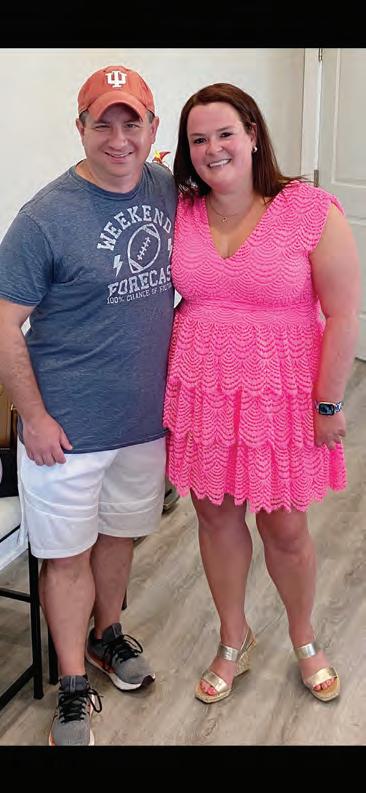

Pearl and Stuart Averbach of Squirrel Hill are proud to announce the arrival of their grandson, Aaron Wolf Peel. Aaron was born on Aug. 19, 2025, and resides in Denver, Colorado, with his mom and dad, Elyse and Shawn Peel. Aaron is named after Shawn’s late grandfather Aaron Schneider and Pearl’s late father, Wolf Glodowski. We share the joy of Aaron’s arrival with his other grandparents, Debbie and Rodney Lerner, and great-grandmother, Joyce Schneider, who reside in Houston, Texas.

“Really? No one ever said a word? Nothing? Not a single person?”
“No. No one said a thing. Not to acknowledge what happened. Not to apologize. Nor explain why they did what they did. Not a word.”
“After everything? Total silence?! What a disappointment!”
“Tell me about it. It’s as if they all vowed never to speak to me again — and kept their word.”
retreat; it was an evasion of responsibility.
Surely, you and I know something of such estrangements. A disagreement between siblings leads to distance. A partner, parent or child pulls away. A friendship fades into avoidance. A longtime relationship is severed, and never again is a kind word exchanged.
Such righteous silences are sadly too familiar today. And if we’re honest, we’ve likely been on both sides of such a shunning. Sometimes, you and I are the ones left wanting; other times, it is we who chose to turn away.
Esther and Jim Neft of Sewickley, Pennsylvania, and Lisa and Jeff Altman of Youngstown, Ohio, announce the engagement of Adam Neft to Marni Altman
A wedding is planned for March 2026 in Columbus, Ohio. PJC
This heartbreaking lament? It belongs to Moshe Rabbeinu — Moses, our teacher: “Give ear, O heavens,” he declares, “Let the earth hear the words of my mouth … ” (Deut. 32:1)
Everyone knows something of Moses’ pain. Live long enough, and you’ve been hurt by another’s silence — or perhaps, you’ve hurt someone with your own.
In this week’s Torah portion, Ha’azinu, after decades spent leading the Israelites through the wilderness, Moses delivers a final address. His words read as both an indictment of communal failure and an invitation to moral renewal. But louder than anything Moses said was what he hears in return.
The Israelites’ greatest failing was not their past mistakes. Though these were significant, such acts could have been addressed and atoned for. Their greatest failure was — at the end of their time together — to encourage the decision (1) to avoid accountability and (2) never to speak to their leader again.
Hear Moses in response to their silence: “They forsook the Rock who bore them; they scorned the God who gave them birth!” (Deut. 32:15) The word Moses uses for “scorned” is yinbalu , which means “they desecrated and dismissed” something precious.

Crickets. Empty air. Nothing but a deafening silence.
Torah suggests the “something precious” was our covenant with God; but in truth, the Israelites’ silence scorned the very bonds by which all Jews are tethered, still to this day. Thus, Moses directs his words beyond those before him — speaking instead to heaven and earth — which is to say, Moses addresses his words to you and me.






After all they’d shared over so many years, when Moses opens his heart to the people and speaks, they respond with a collective, soul-shattering silence.
Over the centuries, the Jewish people’s decision to say nothing has stirred both curiosity and concern. In the fifth century, the authors of Midrash Tanchuma saw the Israelites’ lack of response as a collapse of moral imagination. Unable to accept Moses’ words, we read, the Israelites withdrew into a shared, shame-filled silence.
So it is, during the Days of Awe, we ask ourselves: Where have we fallen into a betraying silence? Where might our own silence — however justified or encouraged in the moment — be rooted in an older pride or shame? What might any of us say or do now to begin making things right?
As we enter 5786, may we use our words, rather than continue to wound others by withholding them — lest our silence be our longest, loudest legacy. PJC






Contemporary scholar Avivah Zornberg describes Moses’ speech as “an act of exposure,” suggesting he held up a mirror to the Israelites and, recognizing themselves, none could bear what they saw. Their silence, therefore, was more than
Rabbi Aaron Bisno is the Frances F. & David R. Levin Rabbinic Scholar at Rodef Shalom Congregation and serves as the rabbi at Temple Ohav Shalom in the North Hills. This column is a service of the Greater Pittsburgh Jewish Clergy Association.










Dr. Milton “Mickey” Henry Black, M.D., died at his home on Wednesday, Sept. 24, 2025. He is survived by his wife, Judith; children Michael Black (Michael Crowdes), Lanie Black Timko (Mark Timko), Robert Black (Kendra Penski) and Scott Black (Chelsea Klimo Black); 11 grandchildren; and nieces and nephews. He was preceded in death by his father, Albert, his mother, Hilda, and his sister Phyllis (Wolf). He was born on Sunday, Sept. 5, 1937, in St. Louis, Missouri, to Hilda and Albert Black. He spent his grammar school and high school years in Pittsburgh, graduating from Taylor Allderdice in January 1955. He graduated from the University of Pittsburgh in 1958 with a B.S. in chemistry and went on to graduate from University of Pittsburgh Medical School in 1963. He then interned in Memphis, Tennessee, at Baptist Memorial Hospital and then returned to University of Pittsburgh to complete his residency in anesthesiology and a fellowship in obstetrical anesthesia. Mickey served two years in the U.S. Army, which included spending a year in Vietnam as an anesthesiologist from 1968-1969. He was awarded the Bronze Star Medal for meritorious service. After Vietnam, Mickey returned to Pittsburgh to practice at Children’s Hospital and West Penn Hospital. In 1978 Mickey left anesthesia to work for United States Steel Corporation in occupational medicine. Already board certified by the American Board of Anesthesiology, he became certified by the American Board of Preventive Medicine in Occupational/Environmental Medicine. Throughout his medical career he served as a clinical associate professor in the departments of Anesthesiology and Occupational Medicine at the University of Pittsburgh School of Medicine. After retiring from United States Steel, Mickey spent several years as a consultant to the U.S. Departments of Energy and Labor. Mickey met his future wife, Judy, in 1967 in a delivery room at Magee Womens Hospital where she was a student nurse and he was completing his fellowship in OB anesthesia. They married in December, 1970. Mickey
Shomer Yehuda, deceased March 2023, of Pittsburgh, Pennsylvania No. 022303058
Avrahom. M Cohen, Administrator; & Elchonon Friedman Co-Administrator; P.O. Box 8202, Pittsburgh, PA 15217 or to Kim A. Bodnar, Esquire, 304 Ross Street, Suite 701, Pittsburgh, PA 15219
Letters of Administration on the Estate of Sonia-Marie Morley, deceased, of 7430 Frankstown Ave., Pittsburgh, Allegheny County, PA, 15208, No. 02-25-05075, have been granted to Nathaniel Morley, 1026 Liverpool St., Apt 2, Pittsburgh, PA 15233, who requests that all persons having claims against the Estate of this Decedent make known the same in writing to him or his attorney, Thomas E. Pandaleon, Esq., 6824 Thomas Boulevard, Pittsburgh, PA 15208, and all persons indebted to this Decedent make payment to the same.
supported Judy’s dream of becoming a physician herself, which began when she started medical school in 1970. He was proud of her success in medical school and ability to combine the role of mother and practicing physician. Mickey was truly a life partner to Judy for over 54 years and will always be remembered by her for being her biggest supporter and best friend. In 1972 Mickey started his most important job, being a dad, with the birth of his first son, Michael. The children will most remember their father for his endless puns, his witty sense of humor, his contagious laugh, his generosity, his rarely missing their sporting events (and there were a lot), his selflessness, and most importantly his relentless commitment and his love for his family. He never hesitated to drop everything to be there and meet the needs of his children. They learned from their father lessons they carry into their own parenting and most valued relationships: being part of the bookend routines of the children’s days, being a touchstone of connection and presence in the mundane routines of everyday life, and the importance of laughter and not taking oneself so seriously. In a world full of noise, Mickey was the quiet voice of reason for many, especially his children. They will miss his wisdom, calm and nonjudgmental presence. Mickey allowed his children to be their true authentic selves, supporting their dreams and giving them the courage to reach beyond their limits. His kids will look back fondly on the quiet times spent with him watching movies, talking about the market and seeing him interact with his grandchildren (and grand dogs). Although Mickey was a knowledgeable and skilled investor in financial markets, all that he invested in the raising of his four children, will surely provide the richest of dividends in generations to come. If so inclined donations can be made to the Jewish Healthcare Foundation for improving care for those experiencing serious life-limiting illness. Jewish Healthcare Foundation 625 Liberty Avenue, Suite 2500, Pgh., PA 15222. Arrangements entrusted to Ralph Schugar Chapel, Inc. schugar.com
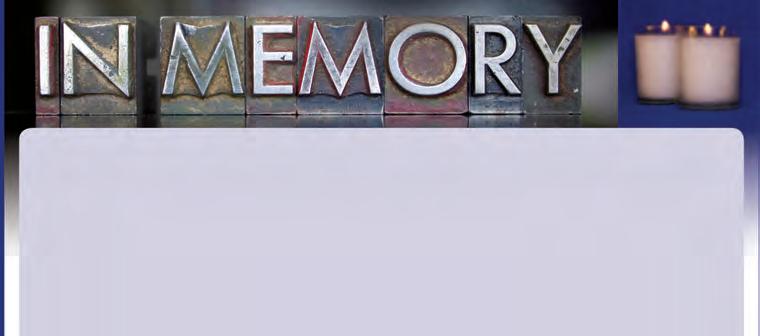
Marc Rice
Simma & Lawrence Robbins
Richard, Mindy, & Logan Stadler
Rina Segal
Nancy K Young
Nancy K Young
Nancy Waldman Yuskovitz & Family
Sunday October 5:
T Weiner
Ruth

















Monday October 6: Joseph Bowytz, Freda K Unikel Bregman, Leah Breman, Dora Brody, Sadie Colton, Bess R Escott, Laura Fletcher, Helen Goldfeder, Leana M Herman, Earl Latterman, Harold Martin Lewis, Ben Markowitz, Celia Miller, Mollie Osgood, Dr Gerald L Ostfield, Elizabeth L Ostfield, M .D , Eleanor W Pettler, Israel Raphael, Clarence Rosenberg, Bessie Ruth Roth, Albert Solomon, Henry Ziskind











Tuesday October 7: Beatrice Ash, Jacob Bennett, Max M Bergad, Morris R Cohn, Max Dine, Harry Dorsey, Jacob Florman, Bess Hansell, Millie Kanowitz, Morris Kempler, Selma Krouse, Pvt Isadore Levy, Ernest Mannheimer, Katie Levine Marcus, Anna Mazer, Bella Olinsky, Esther Simon, Max Staman, Anna Stein, Nathaniel Steinberg, Barbara Ruth Weisenberg, Louis Wesoky, Louis Aaron White, Milton Wirtzman
Wednesday October 8: Esther Aronovitz, Allan H Barnett, Jack Bergad, Cecilia Weis Bluestone, Frances Sylvia Brown, Ann Colker, Annette Klee, Charles Kovacs, Bernard S Labbie, Fannie Lieberman Lawrence, Sadie Moldovan, Joseph Moskovitz, Samuel H Richman, Louis M Sachs, Aaron Joel Schwartz
Thursday October 9: Sylvia Auslander, Leo Berkowitz, Mary Burke, Gilbert B Cramer, Iris Cummings, Murray Feiler, Rose Fisher, Elinor Sarah Goldman, Jack Hirsch, Joseph Louis Hochman, Rose Isaacson, Sophia Korsunsky, Sam Nadler, Joan M Pettler, David Nathaniel Racusin, Walter Jacob Robins, Myer Shapiro, Alexander Sharove, Ben Shrager
Friday October 10: Ida M Breman, Sam Chizeck, Judith Kochin Cohen, Lillie Levy, Shirley Watchman Loefsky, Selma Luterman, Esther Mallinger, Frieda Gelman Margolis, Rose L Miller, Sarah Mormanstein, Lena Newberg, Sadye Breman Novick, Rose Cohen Rattner, Mollie Robins, Joseph Scott
Saturday October 11: Allen A Broudy, Fannie Sulkes Cohen, Shachny Grinberg, Jeanette Gross, Rebecca Herman, Anita Lois Hirsch, Meyer Jacobs, Pauline Klein, Paul G Lazear, Joseph Robert Lipsich, Clara M Oberfield, Harry Pearl, Marti Pettler, Melvin N Rosenfield, William Sable, Tillie Scott, Jacob Soffer, Samuel Supowitz, Louis Zeiden
Obituaries:

FELDMAN: William “Bill” Feldman, age 94, of Squirrel Hill, passed away on Sept. 23, 2025. Son of the late Sadie Mendelson and Isadore Feldman. Brother of Bernard Feldman, who predeceased him. Survived by his beloved wife of 49 1/2 years, Trudi. He is survived by his children Laurie Feldman of Portland, Oregon, Stuart Feldman of West Palm Beach, Florida, stepchildren Robin Friedman (Jerome) and Sam Bloom. He was also Papa Bill to his four grandchildren: Lauren Friedman Graham (Joseph), Jared Friedman, Jordyn Bloom and Casey Bloom. He was the brother-in-law of the late Billy Leiber and his wife, Sara. After graduating from Peabody High School in 1949, Bill joined the U.S Army and was stationed at the Pentagon, Washington, D.C., where he attended language school and learned Russian. Following his discharge, he attended Duquesne University, majoring in accounting. He worked for Jeanette Auto Parts for many years and then started his own accounting practice in 1994. He continued doing tax work for clients until last month. At the age of 34, Bill took up the game of tennis, where he excelled with his lefty slice, and he continued playing in several games regularly at Highland Park Tennis Courts until he was 90, where a party was held in honor of his birthday. Services were held at Ralph Schugar Chapel, Inc. Interment Homewood Cemetery. Contributions may be made to Tree of Life Congregation (treeoflifepgh.org). schugar.com
KLEIN: Hannah (Honey) Klein passed away on Aug. 27, 2025. She was 84. Born and raised in the Squirrel Hill neighborhood of Pittsburgh, Honey is one of three daughters of Lillian and Maurice Sadowsky. Honey graduated Taylor Allderdice High School and the University of Pittsburgh, where she was a member of the Sigma Delta Tau sorority. In 1969, Honey and her









husband of 62 years, Louis (Lou) Klein, moved to Paradise Valley, Arizona, where they resided for over 55 years. Honey spent time as an elementary and Sunday school teacher. She enjoyed needlepoint and painting in her spare time. Honey was competitive and passionate about her hobbies including tennis, mahjong, poker and bridge. As a bridge player she achieved the coveted rank of Life Master. Honey is survived by her three sons, Marc, Alan and Jeff, and their families, including her four grandchildren, Joshua, Alyssa, Gabrielle and Hailey, and her sister, Ellen Sadowsky.





KWELLER: Susan Kweller, (19412025), age 84, passed away on Sept. 21, 2025, at Canterbury Place after succumbing to a series of illnesses against which she struggled for years. Her amazing tenacity, strength and will to live carried her through medical challenges that few could have endured. She was truly a valiant fighter to the end. Susan was born in Pittsburgh on March 13, 1941, to Phyllis (Silverman) Lhormer and Sydney Silverman, who preceded her in death, as did her brother, Thomas N. Silverman. She was the beloved wife of Michael Kweller, and beloved mother of Amy (Larry) Nordby and Sherry (Daniel Berczik) Halsband. Susan’s passing leaves an enormous void that cannot be filled for her family and her many dear and lifelong friends
technical wizard with
truly remarkable mother, wife, friend and teacher. Services were held at Ralph

Judith (Schulhof) Stein passed away on Wednesday, Sept. 10, 2025, at the age of 85. Beloved wife to Irwin Stein. Loving mother to Robert Stein (Edie), Paul Stein and Michelle Stein Glick (Michael). Sister to Jay Schulhof. Cherished grandmother of Stephanie Stein Moldovan (Justin), David Stein (Gwynne), Gabriella Stein Katz (Ami), Samuel Glick (fiancée Shayna), Elizabeth Glick and Abigail Glick. Adored great-grandmother of Lev Stein and Allie Moldovan. Judy was born and raised in McKeesport, Pennsylvania, to Leonard and Lillian Schulhof. She completed her undergraduate degree in education at he University of Pittsburgh. She worked as a teacher before starting a family. She then moved to Pittsburgh and dedicated her life to her family and to the raising of her children. Services were held at Ralph Schugar Chapel, Inc., and interment was at Poale Zedeck Memorial Park. Donations in Judy’s memory may be made to Congregation Poale Zedeck or to Hillel Academy of Pittsburgh. PJC













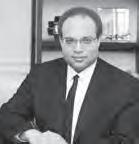





Smith-Rosenthal Team
Jason A. Smith & Caryn Rosenthal
Jason: 412-969-2930 | Caryn: 412-389-1695 Jasonasmith@howardhanna.com Carynrosenthal@howardhanna.com


Mayer, Realtor Squirrel Hill Office C: 412-760-0412 O: 412-421-9121x225 sherrimayer@howardhanna.com HowardHanna.com









































By Sharon Wrobel | The Times of Israel
Last month, two Israeli neuroscientists rolled out a blood test in the U.S. and Israel that they say can measure the responsiveness of a patient with major depressive disorder to common antidepressants.
Depression is one of the most common forms of mental disorder, affecting more than 330 million people worldwide. Treatment methods rely primarily on a taxing trial-anderror process to find the right prescription drug, which can take years.
In Israel, the psychological toll of 23 months of war and counting has made the need for effective mental health treatment felt more than ever.
The blood test, created by Dr. Talia Cohen Solal and Dr. Daphna Laifenfeld of Israeli health tech startup NeuroKaire, promises to create a platform for personalized treatment of mental disorders. Guided by the test results, clinicians and psychiatrists can determine which treatment is most suited to a particular patient’s condition.
“For far too long, patients with clinical depression have endured a grueling trial-and-error process before finding an effective treatment,” Cohen Solal told The Times of Israel.
“Around one-third of the time, a patient

improves or recovers from depression when seeking treatment, and around two-thirds of the time, physicians will need to change their medication or dosage multiple times.”
“Typically, the guessing game of identifying the right drug for a patient with clinical depression can take between 12 to 18 months. We are bringing that down to two months,” she claimed.
The blood test began being offered in Israel and the U.S. last month, though the new technology still needs more research and trial data to determine its effectiveness, according to Prof. Mark Weiser, who heads the Psychiatry Department at Sheba Medical Center, which




was involved in testing the process.
“NeuroKaire’s unique combination of stem cell technology, genomics, and AI represents an evolutionary step forward from traditional pharmacogenetics and is promising, but it is still early days, and more research needs to be done in large clinical trials with hundreds of patients, comparing the outcomes with those that haven’t taken the test, and further improve results for patients,” Weiser said.
NeuroKaire’s blood-based screening tool, BrightKaire, was recently granted laboratory-developed test regulatory approval from the Centers for Medicare & Medicaid Services in the U.S., making it the first clinically deployed test based on neurons derived from blood, the startup said.
Following the regulatory approval, the blood test has been made available to physicians and patients in Israel and in the U.S. for $1,000. The test is reimbursed under several premium and private insurance plans in the U.S. and Israel, including Medicare Part B, Cohen Solal said.
“We have around 100 active prescribing psychiatrists at present,” said Cohen Solal.
Cohen Solal and Laifenfeld have decades of academic expertise in brain research and personalized medicine between them. Cohen Solal spent a decade studying psychiatric disorders at Oxford University, University College London and Columbia University.
personalized data, including a patient’s genetic data, medical history and microscopic neuronal imaging, the test produces a report detailing the patient’s response to different medications, including the likelihood of side effects.
“Depression is reduced connectivity in the brain, often expressed in a lack of motivation,” Cohen Solal explained. “With our brain in a dish platform, we have a window into the brain and can analyze how well those neurons are connecting or communicating after exposure to antidepressants, and we turn that into a quantitative readout for how strongly a drug has affected connectivity in those samples.”
“Our brain in a dish technology tells you not just if the drug gets past the liver to the brain, but what it does in the brain and whether it works,” Cohen Solal noted.
Cohen Solal said that the startup has validated the technology in clinical trials of the blood-based diagnostic in Israel in collaboration with Sheba Medical Center in Ramat Gan and Geha Mental Health Center in Petah Tikva. In the U.S., trials were conducted at Jefferson Hospital in Philadelphia and in collaboration with the National Institute of Mental Health. In addition, NeuroKaire has formed partnerships with Israeli biotech companies Clexio and Neurosense.
“In the past two decades, our knowledge of human genetics and brain biology has advanced at an unprecedented pace, but it is still limited,” said Weiser. “The underlying problem is that when a patient comes for treatment, there is no test based on biology as to whether I should prescribe Prozac or a different antidepressant, but it is based on consultation and clinical impressions.”
Weiser said other companies that have developed blood tests based on genes to determine the best drug treatment for depression, were not well-validated.
In 2023, NeuroKaire expanded to the U.S. and opened a commercial lab, while its R&D center, employing 25 people, is based in Tel Aviv. To date, the startup has raised $25 million from venture capital investors, including GreyBird Ventures, Meron Capital, Jumpspeed Venture Partners and Sapir Ventures.

Laifenfeld has worked in brain research at the Israel-based Technion and Harvard University in the United States, and has over 20 years of experience in personalized medicine, including serving as head of precision medicine at Teva Pharmaceuticals Industries.




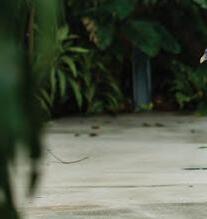

The two neuroscientists met when Cohen Solal immigrated from the U.S. to Israel in 2017, and they decided to join forces to found NeuroKaire in 2018. The two shared a vision to develop a more precise personalized test that clinicians could use in order to pick the optimal drug therapy for patients with clinical depression.
Starting their journey at BioGiv, a lab compound for young startups in the Givat Ram campus of the Hebrew University in Jerusalem, Cohen Solal and Lifshitz-Leipnfeld developed a test based on the “brain in a dish” model, where stem cells are crafted in the lab from a patient’s own blood sample using stem cell technology.
NeuroKaire’s R&D team then turns the stem cells into frontal brain neurons — the brain region most implicated in mental illness and depression — and tests them against 70 different antidepressants, helping to pinpoint the most effective drug or combination therapy for each patient.
Using a proprietary AI platform to analyze
“Israel has fantastic life sciences and neuroscience PhDs, which is wonderful for hiring great R&D scientists,” Cohen Solal said. “It’s a mission of ours because of Israel and because of the war to launch this test here as well, and we are very happy to be able to help in this time of need.”
A report published by the State Comptroller’s Office earlier this year found that approximately 3 million Israeli adults may suffer from post-traumatic stress disorder, depression, or anxiety as a direct consequence of the events of the Oct. 7, 2023, Hamas-led massacre in southern Israel and subsequent war in Gaza.
“Many of the drugs overlap for depression and PTSD,” said Cohen Solal. “Physicians can use our technology to help them choose between PTSD medications as well.”
“But in the future, we will specifically be recruiting cohorts of PTSD patients so we can validate it as well in the PTSD setting,” she added.
Cohen Solal said that depression is the first indication, but going forward, tests for other neurological conditions are being planned using the same method.
“NeuroKaire’s mission is to bring precision medicine to the brain,” said Cohen Solal. “Next year, we will be starting our studies in ADHD. That’s going to be our next indication.”
Shofar so good
Hillel Academy of Pittsburgh students prepared for the new year by making shofars. Sounds from the small ram horns signaled the season’s call to awake from slumber.


in the lines
A pre-Rosh Hashanah lesson culminated in writing cards and coloring pictures of apples for residents of Weinberg Terrace. The new year’s greetings gave students the opportunity to explore

A type of tagging
A Sept. 16 back to school night allowed parents and family members to discover student accomplishments at Community Day School. Along with observing classroom creations, guests received honey cakes to bake for the new year.


Students at the JCC Early Childhood Development Center created classroom signs. The artistic endeavor allowed young learners to leave their mark on the walls.
Beth El Congregation of the South Hills hosted a PJ Library event. The program sends free Jewish children’s books to families with young children, through the Jewish Federation of Greater Pittsburgh.





